
Disclosure: This article contains affiliate links, meaning that when you make a purchase, I earn a small commission. For more information, see the site Disclaimer .

College essay don’ts: 37 Things to Avoid In a college essay
Knowing what not to write about in a college essay is just as important as knowing what to write about!
This post is all about college essay don’ts , including college essay topics to avoid and how not to write your college application essays.
It’s so important to know what NOT to write about in your college application essay. Whether you’re crafting your essay for the Common App or writing shorter college-specific essays, you need to know how not to write a college essay.
Choosing the wrong topic for your college application essays could mean that you don’t get admitted to your dream school or you miss out on scholarship money.
Since you really only have one chance to get it right, you need to know what topics to avoid in your college admissions essays, general college essay don’ts, and what other pitfalls to avoid when writing your college essays.
Essay writing may feel overwhelming and stressful, but knowing what not to do will help you write a great college essay!
What not to write in your college application essay
So you know exactly what not do in college admissions essays, here are 37 college essay tips about college essay don’ts. Follow this advice to know what not to write about in your college essay!
1. Don’t restate the Essay prompt
Start your essay with a hook. Start with dialogue. Start by setting the scene.
Don’t start by restating the essay topic! The reader knows the essay prompts, so just start telling your story.
A great story will immediately grab the attention of the admission officers and make them want to keep reading!
2. Don’t try to be funny in your college admissions essay
There’s a good chance that what you think is funny may not be funny to the admissions officer. And even if your admissions officer thinks it’s funny, the dean of admissions may not agree.
Clever writing that naturally tells a funny story will get you further than trying too hard to make everyone laugh.

3. Don’t swear
You might not mind vulgar language, but many people do. It will come off as tasteless and crass. Simply put, curse words should not be part of your college admissions essay.
4. Don’t just tell the reader what you think
Tell the reader what you did, how you felt, how you changed—not just what you think. Admissions officers don’t want to read about what you think in the abstract.
They want to know what has happened to you in life, how that’s affected you, and what you did as a result.
Write an engaging, interesting story that shows the reader how you’ve grown and what you’ve learned.
5. Don’t try to Appear perfect
It’s okay that your life is messy and you don’t have it all together. It’s okay that you’re not super organized and you don’t know what you want to be when you grow up.
Your college essay doesn’t need to be about how awesome you are (really, it shouldn’t be!). It just needs to be about the real you. Remember, your personal essay for college should be just that—personal!
6. Don’t brag
Your achievements are all listed on your resume.
Writing about how great you are, how you saved the day, or how you’re a hero to others is not going to make a positive impression on the reader.
Leave the bragging to the people who wrote your letters of reference.
7. Don’t emphasize status
Avoid topics that emphasize your financial privilege. Voluntourism trips to aid people living in poverty in far-flung areas of the world is a key example of this.
Don’t write about going on a mission trip to a third world country to volunteer to help the less fortunate and how you learned how privileged you are. Just don’t.

8. Don’t lie
Don’t inflate your accomplishments. Don’t pretend to be someone you’re not.
If you write something dishonest in your essay, it won’t match the other parts of your application. If you were found to have been dishonest when writing your essay, you will not be offered admission at that college.
9. Don’t reveal too much
If you have faced personal challenges, like addiction, mental health struggles, or learning disabilities, those struggles are part of you. You should feel proud of overcoming them.
But your college admissions essay is not the place to share your most deeply personal experiences.
Some college admissions officers may read about your challenges and want to welcome someone with your tenacity and spirit to their campus.
Unfortunately, most admissions officers will read about your challenges and worry that you will face similar issues at their university.
Many colleges choose not accept applicants who have demonstrated past mental health issues. This might not seem fair, but it is reality. Don’t hide your true self or be dishonest, but carefully consider how much you want to reveal in your admissions essay about your private struggles.
10. Don’t write about illegal activities
It’s a safe bet that most colleges do not want to admit students who have a history of participating in illegal activities.
Even if you plan to talk about drug use, alcohol use, jail time, or committing crimes as a way to show growth and discuss lessons learned, illegal activities show a lack of maturity and questionable judgement.
Writing about criminal behavior will not reflect well on you as a candidate for admission. Illegal activities make bad topics for college essays.
11. Don’t summarize your resume
This is one of the biggest college essay don’ts! Your college essay is your opportunity to tell the college admissions office who you really are and what really matters to you.
Your resume already lists your activities, and your transcript details your grades. Your college essay isn’t the place to review these facts; it’s your chance to stand out by telling your story.
12. Don’t tell a general story
Be specific. In fact, be very specific. Focusing on the details of your story will help make your college essay unique so that it stands out.
A good college essay will tell a story that could only have been written by you—no one else.
Instead of telling a biopic story of your life, focus on one aspect of your life—your beliefs, a meaningful experience, a key event—that explains who you are and what matters to you.

13. Don’t write about cliché topics
Avoid writing about the sports victories and defeats. Winning a big game or losing a championship game might mean a lot to you, but sports are common topic and best avoided.
Don’t write about overcoming an academic setback or a romantic breakup.
14. Don’t write about something controversial
You don’t know who will be reading your college admissions essay, and they might not agree with your views on controversial topics.
Moreover, your reader might not appreciate how you approach a sensitive topic. You might appear close-minded and unempathetic.
The last thing you want to do is make the admissions officers reading your essay think you would bring discord to the campus community.
15. Don’t undervalue the small stuff
Great essays can be crafted from the small, personal details of daily life.
Don’t underestimate what interesting essays can be written about your morning routine, your favorite family recipe, your relationship with your sibling, or what you do on a snow day.
In fact, some of the most memorable, best essays have been about a random item, food, or daily routine.
16. Don’t go negative
Criticizing other people, your current school, or anything else will probably just make a bad impression on your readers.
Don’t whine about your life. Negativity says more about you and how you perceive the world around you than it does about anything else. Certainly don’t criticize the college you’re applying to!
If you do want to write about negative experiences you’ve had, quickly move on to discussing what you’ve learned or how you’ve grown as a result of those experiences.
17. Don’t be pompous
Never assume that you know better than your readers or that your approach is the only way.
Don’t tell your reader what they should think. Avoid making generalized value judgements.
18. Don’t go completely off topic
Don’t try to stand out by submitting a poem or creative writing sample.
Write a thoughtful, well-crafted essay about yourself, just like they asked for.
Show that you respect the school admissions committee’s request and can follow directions.
19. Don’t ignore the prompt
College admission essay topics are designed to allow you a lot of freedom in how you answer. Craft a story that tells something about you, within the framework of the prompt.
Just double check that your essay answers the prompt, to make sure you didn’t veer off topic as you wrote and edited the essay.
Also know that you can write about whatever you’d like to . In your essay writing process, if you find that the first prompt you chose isn’t working out, choose a different one and start again.
20. Don’t get the tone wrong
Your college admissions essay is not an expository essay, formulaic and devoid of warmth. Nor is it the right time for you to use all the fancy words you’ve been studying for the SAT.
Your college admissions essay should be engaging, show your personality, and sound like you—a teenager reflecting on your life thus far.
21. Don’t write a trite conclusion
If your essay has done its job, you shouldn’t need to sum it all up for the reader in a neat little final sentence.
If you have shown your reader what you’ve learned, how you’ve grown, or who you are, you don’t need to say it explicitly at the end of your essay.
The conclusion is often the hardest part of the essay to get just right, so don’t worry if it’s hard to find the perfect words. Take a break from writing it and come back in a few days to get a fresh perspective on what you’re trying to say.
22. Don’t wait until the last minute to Write
Start writing your college admissions essay weeks, if not months, before its due. Senior year is an incredibly busy time, so it’s a great idea to get started on your college admission essays as early as possible.
Leave plenty of time to think about what you want to say, revise and edit, and finalize the essay. You’ll be amazed at how your essay can improve if you allow ample time to work on it.
If you’re going to apply early decision or early action, consider starting to work on your main essay the summer after junior year, before your senior year even starts, or early in the fall of senior year.
23. Don’t ignore the word count
You don’t want to write too much or too little. Aim to be within a few words of the word limit. Express yourself clearly and concisely.

24. Don’t repeat your resume
When you’re writing your personal statement essay, don’t just repeat your high school resume.
Your personal essay is your chance to talk about an aspect of your personality or life experiences that can’t be found anywhere else in your college application.
The list of courses you’ve taken (and your grades) tell about your academic interests. So there’s no need to turn your essay into a list of your academic achievements!
Your extracurricular activities show what you’re interested in and how you use your time. If you want to discuss how your extracurricular activities have been formative experiences for you, focus on one particular example. Don’t re-list all your volunteer experiences!
Your personal statement essay should reveal something about you that doesn’t show up in the rest of your application.
25. Don’t write about an “example” topic
If you have read some amazing examples of college essays, and you’re thinking that you could write on that same topic, don’t.
Chances are, if your English teacher pointed out those examples, or you found them via a Google search, every other high school senior (and every school admission officer) has seen those essays too!
Instead, dig deep and write your own amazing personal statement !
26. Don’t copy and paste
It’s completely fine to use the Common App to submit your personal essay to every school on your list (as long as they accept the Common App, of course).
But for each college’s specific essays, tailor your essay to each school. Include specific details about each college that make you want to go there. And make sure your responses are appropriate to the culture of each college.
If you do copy and paste your essays, be sure the essay doesn’t refer to the wrong school!
27. Don’t overuse the thesaurus
Everyone gets stuck using the same words over and over again, and it’s fine to check a thesaurus when you’re writing.
But don’t use big words just in an attempt to impress the college admissions officers. Don’t use words you don’t really understand to try to sound smart.
For a great college application essay, write naturally in your own voice and let your true personality show.
28. Don’t plagiarize
If you’re submitting someone else’s college essay as your own, you’re giving up the chance to share your unique story with the admissions office.
You’re also risking an automatic rejection if you’re caught!
29. Don’t be fake
Use your essay to tell the admissions officers what you want them to know about you.
Don’t try to guess what the admissions officers would like for you to say or try to be someone you’re not.
Don’t invent a tragic event in your past, claim to have done hours and hours of community service you haven’t done, or exaggerate any aspect of your life.
Be authentic, write with your own voice, and craft an essay that stands out from the other applicants.
Simply take your time to craft a thoughtful essay that tells your personal story. Talk about your unique perspective on one specific experience in your life, using your authentic voice.
30. Don’t write a school essay
Your college admissions essay is not a five-paragraph expository essay that you would write for English class.
A winning college essay should have a beginning and an end, but the part in the middle should tell a good story, not make an argument in three points.
The expository essay style of writing might be what your English teacher wants, but it makes for bad college essays.
For a college application, a well-written essay will examine your personal growth, your unique experience in life, and the different perspectives through which you see the world. And you should do this by crafting an intriguing story about a specific moment or experience that was significant to you.

31. Don’t Avoid feedback
If you’re feeling stuck, feel free to ask someone else—a teacher, parent, family member, or friend—to read your essay. Getting feedback on your entire essay is the best way to get a sense of how admissions officers will respond to reading it.
Feedback does not mean that they tell you what to write or how to write it.
Feedback should mean getting input from someone else can help you learn where your essay veers off point or where you need to dig deeper to tell a better story.
32. Don’t skip editing
Please allow enough time to write AND edit your essay. Ideally, you will write a first draft of your essay, then edit it, then get feedback, then edit it again, then write a final draft (then proofread it—see below).
Expect to write at least three or four, and maybe many more, drafts of your college application essay. Your essay will improve with each round of editing.
The essay writing process can be time consuming, but in the end you’ll have a strong essay to share with college admissions offices, so it will be worth it!
33. Don’t overedit
What? Didn’t I just tell you to edit?
Yes, absolutely. Just be sure that after you’ve shown your essay to trusted readers and you’ve made your edits, your story still remains.
The essay should still have your voice and should tell the story you want to tell.
34. Don’t skip proofreading
After you make your edits and write a “final draft,” you might want to click send and submit your essay. But not so fast!
Take time to do a final proofread of your essay.
Better yet, ask a teacher, college counselor, or someone with excellent grammar and spelling skills to proofread your essay. Having a fresh set of eyes on your essay will help ensure it is error-free.
35. Don’t just rely on Spellcheck
It’s really important to have an actual person proofread your essay.
Spellcheck and other editing software won’t necessarily catch grammar errors, typos, or poorly structured arguments.
It’s always a good idea to trust the final proofread of your essay to a person, rather than technology.
36. Don’t submit your essay at the last minute
You never know when a website will get glitchy!
Don’t take a chance that the Common Application or an individual university’s website won’t act up at a crucial moment. Do your best to upload your college essay at least a day before it’s due!
The admissions process is stressful enough without adding in technical errors. Don’t risk missing the deadline by procrastinating!
37. Don’t submit an incomplete essay
When you’re in the Common App website or a specific college’s application portal, and you attach your admission essay, scan it quickly before hitting the submit button.
Be sure you attached the correct file or that the complete essay transferred when you copied and pasted it into the online form.
It won’t matter if you write a great essay if you don’t submit it correctly!
Final thoughts on college essay don’ts and what not to write in your college essay
Personal essays are a key part of the college application process. College admissions counselors, especially at smaller colleges, use college essays to learn more about the applicants applying for admission at their school.
An amazing college essay might not make up for bad grades or a lack of extracurriculars, but a poorly written essay may push your application into the reject pile. This is especially true now that test scores are usually optional.
Successful essays allow admissions officers to learn about your personal qualities, your take on global issues, and how you might contribute to campus life.
Writing a great college admission essay is the most important thing you can do to make a great impression on the admissions team.
After looking at so many college applicants, test scores, GPAs, and awards all blend together. It’s the personal essays that stand out when admission counselors are deciding which high school seniors will be accepted.
So, it’s worth taking your time to write the best college admissions essays you can.
By avoiding all these college essay don’ts, you’ll know what not to write in your college essay.

How to Write an Amazing College Essay: 25 Tips
Why you’re writing a college essay, how to choose a topic for your college essay, how to write an amazing college essay, how to edit your college essay, and how to make your college essay stand out.

9 tips for How to Write a College Essay That Stands Out
Are you wondering how you’ll manage to write a college essay that stands out from all the other admissions essays? How do you even start writing a standout college essay? If you’re a high school senior…

Can I use the same essay for different colleges?
Can you submit the same essay to different colleges? Yes, no, and maybe. You have so many essays to write for college applications! There’s your main college admissions essay, or the personal statement. There are college…
Graduate of Brown University, higher ed professional, and mom of three. Sharing everything I’ve learned about college with you.
Similar Posts

High School Senior Year Bucket List: 150 Fun Things to Do
Are you looking for the best senior year bucket list? This post will inspire you with the absolute best…

How to study for the SAT: Prep for an awesome score
How to study for the SAT: what you need to know to prep for an awesome score

Using the same essay for different college scholarships
Is it possible to use the same essay for different college scholarship applications? Yes! With a bit of careful…

College Visits for Juniors: A Perfect Time for Campus Tours
Junior year is the perfect time to begin visiting colleges. These tips for planning college visits for juniors and what juniors should do on college visits will help you make the most of each campus tour!

What is rolling admission? Is it Right for You?
Are you wondering what rolling admission to college is? What are the advantages of rolling admission? Is rolling admission…
- Lake Park High School Scholarship
- The College Careers Consulting Homeschool Scholarship
- Free Consultation
- 708 268 5230
- [email protected]
College Essay Don’ts: 20 Things to Avoid to Stand Out
- August 19, 2023

College admissions officers have their own preferences when it comes to essays, but they all tend to agree on what they dislike. It can be disheartening to think that you can’t guarantee a perfect essay, but avoiding certain mistakes will increase your chances of success. A blunder in your college essay could potentially cost you admission to your dream school. The good news is that many of these mistakes can be easily avoided if you understand what they are and why they matter. If you’re looking for guidance, here’s a closer look at what you should avoid writing in your college application essay.
#1 No need to show off your Academic Superhero Cape!
(aka – avoid repeating information) Your grades and awards already speak volumes. Let’s focus on the real YOU! Think about what the application already says about you and avoid repeating the information already present in your academic record, such as your grades, test scores, and extracurricular activities. Instead, focus on unique aspects of your personality and experiences.
# 2 Don’t Be a Topic Troublemaker:
(aka – avoid controversial topics) Stay away from controversial subjects that’ll make the admissions officer do a double take! No political hot buttons, please! Examples: Avoid writing about gun control, abortion, or immigration policies.
#3 Say No to Essay Monotony:
(aka – avoid a general topic) It’s not a robotic analysis; it’s a character-revealing adventure! Share specific moments that highlight your amazing self in action! For instance, write about a particular challenge you faced and how you overcame it, revealing your determination and resilience.
#4 Famous Quotes, Really?
( aka – avoid opening with a famous quotation) Unless it’s your life motto, let’s save the inspirational stuff for Pinterest boards. Your own words rock, buddy!
#5 Avoid Making Someone Else the Star:
(aka – avoid writing about someone else) Though it might be tempting to write extensively about a role model or someone else’s accomplishments, it’s a bad idea. Making them standout is not the goal. The essay should primarily focus on your own experiences, growth, and achievements.
#6 Don’t Dribble Away Your Essay on Sports:
(aka – avoid sports) Sports enthusiasts, listen up! Even if you’re the next LeBron or Serena, don’t dribble away your essay on sports. Show them your versatility! Everyone writes about sports. Even if sports are your strong suit, it’s advisable to avoid writing solely about them. Instead, explore other aspects of your life or personal interests to provide a well-rounded portrayal of yourself.
#7 Tragic Topics Need a Twist:
( aka – avoid tragic topics) Tragic tales need a twist! Only focus on personal growth through tough times. No tearjerker drama without redemption, please!. Here are some examples: Loss of a loved one: While it can be tempting to write about the profound impact of losing a family member or close friend, it’s important to shift the focus towards personal growth, strength, or lessons learned from the experience. Avoid dwelling solely on the sadness and grief associated with the loss. Serious illnesses or medical conditions: Writing about personal health struggles can be challenging, as it’s important to strike a balance between sharing the experience and highlighting one’s ability to overcome adversity. Focus on resilience, determination, or the insights gained from facing the challenge rather than just recounting the medical details. Natural disasters or tragic events: Discussing traumatic events like earthquakes, hurricanes, or acts of violence can be sensitive. If you choose to write about such events, it’s crucial to emphasize personal growth, community resilience, or efforts made to contribute positively towards recovery or prevention. Avoid sensationalizing or dwelling excessively on the tragedy itself. Personal accidents or injuries: If you’ve experienced a serious accident or injury, be cautious when writing about it. Instead of focusing solely on the negative aspects, highlight your determination, perseverance, or the lessons learned during the recovery process
#8 Start With a Bang, Not a Yawn!
(aka – avoid preludes) This is an essay about…” Snoozeville! Starting your essay with a generic introduction lacks creativity and engagement. Grab the reader’s attention with a compelling opening that sets the tone for your unique story.
#9 No Fairy Tale Ending:
(aka – avoid cliché endings) No happily ever afters, my friend! Show them your learning, don’t tell them. Leave ’em wanting more! Conclude your essay without resorting to a cliché ending. If you have effectively conveyed your growth and lessons learned throughout the essay, there’s no need to explicitly state it again in the conclusion.
#11 Don’t Play Professor Know-It-All:
( aka – avoid campaigning) Avoid pleading your case. Let your story speak for itself! Refrain from telling readers what they should think or advocating for a particular viewpoint. Instead, focus on expressing your own thoughts and experiences without trying to persuade or convince the reader.
#11 No Black Holes:
(aka – avoid being flawless) Don’t get lost in your own thoughts. Embrace your complexities, including your mistakes and imperfections, rather than presenting an idealized version of yourself. It’s more effective to embrace vulnerability and showcase personal growth. Admissions officers value authenticity and want to understand the real person behind the achievements. Sharing genuine experiences, including setbacks and lessons learned, allows the reader to connect with the applicant on a deeper level and fosters a more meaningful understanding of their character and potential contributions.
#12 Too Much Info Alert!
(aka – avoid oversharing) Be cautious about sharing too much information in your essay. While no stories are off-limits, present them in a way that captivates the reader and invites them into your experience, rather than traumatizing the reader and pushing them into a black-hole. Example: In an essay, one of our students delved into a traumatic event from his childhood where he witnessed a violent crime. Rather than approaching the topic with sensitivity and focusing on personal growth, he described every gruesome detail of the incident. He vividly recounted the blood-soaked scene, the screams echoing in his ears, and the fear that consumed Him. The essay became a graphic and unsettling account that could potentially disturb or traumatize the reader.While it’s important to share personal experiences authentically, it’s equally crucial to consider the emotional impact on the reader. Oversharing in this context involves providing excessive and distressing details without proper consideration for the potential impact on the audience. Instead, it would be more appropriate to focus on the emotional journey, resilience, and personal growth that stemmed from that traumatic event, while omitting explicit and potentially traumatizing elements.
#13 Leave the Fiction To the Novels:
(aka – avoid lying) No made-up stories about yourself, okay? Keep it real, authentic, and genuine! Never fabricate stories or exaggerate your experiences in your essay. Admissions officers value honesty and integrity, and it’s important to present genuine narratives that reflect your true character.
#14 Avoid The Ego Extravaganza!
(aka – avoid overconfidence) No need to shower yourself with endless praise. Instead, embrace humility and share a moment of doubt or setback. It’s all about growth, baby! Consider discussing a setback or moment of doubt that highlights your resilience and personal growth. Student Example:In my college essay, I proudly proclaimed, “I am simply exceptional in everything I do. From acing every exam to effortlessly leading multiple clubs and winning countless awards, my accomplishments speak for themselves. It’s clear that I am the epitome of greatness and a force to be reckoned with.”This example exudes an overconfident tone by emphasizing the author’s achievements without any humility or self-reflection. It lacks depth and fails to provide insight into the person behind the accomplishments. The essay solely focuses on accolades and fails to highlight personal growth, setbacks overcome, or lessons learned from challenges.
#15 Don’t Diss The Reader:
(aka – avoid belittling) Refrain from talking down to or demeaning the reader in your essay. They are not minions. Keep the tone respectful and inclusive!
#16 Dump Being Robotic-Like:
( aka – avoid being cold) Let your emotions flow like a river. Show them the real you, with heart and soul! Infuse the essay with your emotions, allowing your genuine feelings to shine through in your storytelling. Unlike the essays you’ve written for class, this essay provides an opportunity to showcase your unique voice and personality. Student Example: “Instead of writing a bland and emotionless account of my volunteering experience at a local animal shelter, I poured my heart into the essay. I vividly described the overwhelming joy I felt when I first met the abandoned puppy, with his timid eyes and wagging tail. I shared the genuine empathy and compassion that welled up inside me as I nurtured him back to health. Through my words, the admissions officers could feel the sense of purpose and fulfillment that I experienced, and they could connect with my passion for animal welfare. By infusing my essay with emotions and letting my genuine feelings guide my storytelling, I was able to showcase my authentic self and create a memorable and impactful essay.”
#17 Don’t Be a Broken Record:
(aka – avoid repeating the same words and sentences) Break the repetition cycle! Spice up your writing with varied words and sentence structures. Keep it fresh and exciting! Repetition can make your writing monotonous and dull.
#18 Look For Grammar Gremlins and Wonky Formatting:
(aka – avoid errors) Pay attention to typos, grammatical mistakes, punctuation errors, and formatting issues. These errors can distract the reader and undermine the overall quality of your essay. Proofread your work carefully and consider seeking feedback from others to ensure your writing is error-free.
#19 Chill Out On the Negativity!
(aka – avoid being negative about the college you’re applying to) Keep any negative thoughts about the college to yourself. Focus on why you’re excited to be part of their community. Positive vibes only! Focus on highlighting your fit with the institution, its values, and what you can contribute to the campus community.
#20 Don’t Waste Time:
(aka – avoid procrastinating) Get those admission officers smiling, not cringing. Make sure to give yourself enough time to write your essay. It’s best to start early and take your time to create a great piece of writing. If you’re struggling to come up with ideas, try brainstorming with friends or making a list of potential topics. Don’t worry if your first attempt isn’t perfect, as the more time you have to work on it, the better it will become. Remember, good writing takes time, so start early and give yourself the time needed to produce a high-quality essay.
Ready to impress the college of your dreams with a standout essay?
Don’t stress! We got you covered. Our essay writing coach, Mrs. Miller, is here to guide you through the process and help you present the best version of yourself on paper. Don’t hesitate to reach out for the support you need to succeed. Contact us today.
The Power of Summer: Writing College Essays and Securing Your Future
The enigmatic college financial conversation: navigating the maze of timing and practicality, related posts.
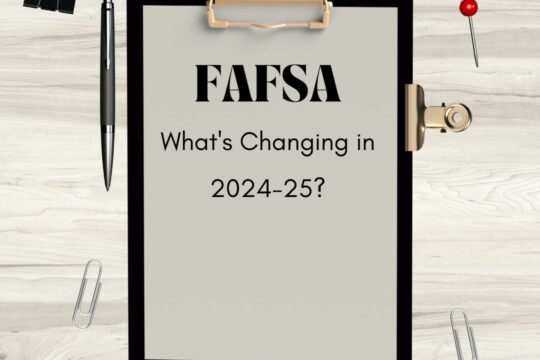
Navigating the FAFSA Maze: What’s Changing in 2024-25?
- November 13, 2023
Username or Email Address
Remember Me
Registration confirmation will be emailed to you.
What are your chances of acceptance?
Calculate for all schools, your chance of acceptance.
Your chancing factors
Extracurriculars.
What If I Don’t Have Anything Interesting To Write About In My College Essay?
What’s covered:, what makes for a good college essay, how to write a dazzling college essay, will your essay make or break your college application.
College applicants are constantly told that in order to be attractive to admissions committees they need to stand out—but how can you stand out when you live a pretty ordinary life? Lots of students worry that the events of their everyday life are too boring or clichéd to be the topic of a really good essay.
That being said, there’s no need to worry! Your college essay doesn’t need to be about an extraordinary experience you’ve had. Rather, it should depict you as extraordinary. “Uninteresting” topics actually make great college essays because the topic itself doesn’t carry the essay—the student’s individuality does.
Read on for tips on how to write a college essay about an “uninteresting” topic that still shows off your personality, values, interests, and writing skills.
The purpose of your college essay is to humanize yourself to admissions officers so that they can see the ‘real you’ behind the grades and test scores you’ve submitted.
Our article about awesome essay topics gives five structures for a good college essay (though there are many more!):
- A unique extracurricular activity or passion
- An activity or interest that contrasts heavily with your profile
- A seemingly insignificant moment that speaks to larger themes within your life
- Using an everyday experience or object as a metaphor to explore your life and personality
- An in-the-moment narrative that tells the story of an important moment in your life
As you might notice, only one of these essay topics references anything exciting, extraordinary, or unique. Set aside the idea that you need to write about something dramatic and unusual. Unusual experiences are not what is most important to admissions officers—rather, it’s important to position yourself as someone that an admissions officer would like to see at their university.
Some things that make for a bad college essay include:
- Not answering the prompt
- Stretching a prompt so that your answer doesn’t make sense
- Writing about a controversial issue, particularly in an irreverent way
- Showing prejudice
- Writing about a clichéd topic
- Writing about anything that advocates disrespect for authority—this can be anything from insulting a teacher to doing an illegal activity
- Assuming the opinions of your reader
Beyond these boundaries, you can pick any topic you want. It’s how you write about the topic that matters!
Read on for our advice on writing a compelling essay that offers a window into your personality and life experiences.
Our guidance for writing a dazzling essay about an “uninteresting” topic involves:
- Picking a value or fundamental truth about yourself that will humanize you to admissions officers and tell them something important about yourself
- Identifying an experience that exemplifies that value or fundamental truth
- Writing a thoughtful essay that uses your “uninteresting” experience to say something interesting about yourself
1. Get the Ball Rolling
There are many different practices you might find useful as you start brainstorming your college essay. These include freewriting, listing, outlines, and more. That said, don’t feel restricted by brainstorming exercises. Remember that they’re meant to start the process and get the juices flowing. Write down anything and everything that springs to mind—who knows what it could turn into?
Sometimes simple questions can open students up and reveal what is important to them. Here are some questions that might help you brainstorm:
- What’s the last news story you read and found interesting? This question can help you identify an issue that you are passionate about or a cause that matters a lot to you.
- What is your proudest accomplishment so far? What about it makes you feel proud? This question can reveal what you consider most important about yourself, which is likely something you find important in life.
- When have you been the most nervous, and why were you nervous? What was the outcome of the situation? This could be anything from an important performance to standing up for an issue you care about. People’s fears can be an indicator of what they value.
- What’s the most recent topic you researched on your own just for fun or self-improvement? Have you found yourself going down a rabbit hole of Wikipedia articles recently? Your interests are important to you and say a lot about you.
- What have you learned from the community you grew up in? What do you value about that community? Your individual history and family history are very important factors in who you are as a person.
- When have you most recently changed your mind about something important? If growth is important to you, admissions officers want to hear about it.
2. Pick Your Value
If you aren’t going to have a flashy topic, you need to make sure that you use your “uninteresting” topic to say something interesting about yourself. When the admissions officer finishes reading your essay, they should feel like they know you better than when they started reading. So what are you going to tell them about yourself?
Your value or fundamental truth about yourself doesn’t necessarily need to be positive, but neutral/negative values will probably need to be accompanied by self-aware reflection throughout your essay.
Values and fundamental truths can be things like:
- I have a growth mindset
- Family loyalty is very important to me
- Giving gifts that people will treasure is important to me
- I don’t like to be like everyone else
- Embarrassment is a major fear of mine
- I don’t like seeing others in pain
- I am super curious
- I always like to be busy
- I don’t like making mistakes
- Having fun is important to me
- I’m a people pleaser
- Self-care is important to me
3. Pick Your Experience
You will want to pick an anecdote, experience, or example that can serve as a channel through which you can communicate your value. Finding significance in a small incident can be incredibly compelling for your readers. On the other hand, you could explore the meaning of something that you do every day or every week. You can even simply muse on one relationship in your life that speaks to your value. Once you have chosen an experience, you have your topic!
Some “uninteresting” essay topics with interesting implications could be:
- Making dinner with my mom on Fridays allows me to see how matriarchal strength has been passed down in my family
- Volunteering at my local community center is how I take care of the natural caretaker in me
- Going to the mall with my best friend is important to me because choosing which stores to go into is structured spontaneity, and I need structured spontaneity
- Making cards for my friends’ birthdays started as a way to save money, but I really enjoy how it fuses technical and artistic abilities in a unique way
- Singing Disney show tunes in the car is when I feel most relaxed because people around me put a lot of pressure on me to grow up fast and sometimes I miss being a kid
- Going to the hospital to visit my uncle after his surgery was uncomfortable for me because I love others so strongly that it truly hurts me to see them in pain
- Sleeping with my same stuffed animal every night makes me feel safe, which is important to me because my sister’s health issues cause me anxiety and it’s nice to have something stable to rely on
Some final notes on choosing your essay topic:
- The topic you initially like the most may not be the one that allows you to write the best possible essay. Be open to trying something different.
- You don’t need to commit to a topic right away. If it becomes clear after you start outlining or writing that your initial plan isn’t going to work as well as you would like, there’s nothing wrong with altering your topic or starting over with a new topic.
If you still feel stuck, we recommend you take a look at the school-specific supplemental essay questions presented by the colleges to which you’re not applying. One of these prompts might spark an idea in your mind that would also be appropriate for the colleges to which you are applying. Check out the Essay Breakdown posts on the CollegeVine blog for a convenient way to look at this year’s essay questions from many different competitive schools.
4. Make Your Experience Shine
Once you’ve selected a topic, you’ll need to figure out how to develop an essay from it that is technically skillful, compelling to the reader, and true to the vision of yourself that you’re working to portray in your application. Remember, the value of your essay is much more in how you write about your experiences than it is in what experiences you write about.
To write a truly effective college essay, you’ll need to focus not just on depicting your chosen experience, but also on expressing your personal experience in an interesting manner. The experience is simply your scaffolding. The focus of your essay should be what that experience says about you—or what you make it say about you.
When writing about an “uninteresting” experience, you will want to be reflective, be self-aware, and show maturity in your view of your experience. Focus on communicating your thoughts and emotions in a way that evokes emotion in your reader and makes them feel connected to you.
Details are also important to pay attention to while writing your essay, as they’ll bring life and context to your story. Vivid and evocative details can turn your “uninteresting” experience into a relatable and interesting scene in your reader’s imagination.
With skillful writing, powerful word choice, and a good sense of how to develop a fragment of an idea into a longer piece of writing, you can make any topic—no matter how “uninteresting” it may seem—into a mature exploration of your values and a showcase of your skills as a communicator.
It depends . A brilliant essay can’t make up for severe deficiencies in your academic qualifications , but it will still have a significant impact, particularly at smaller and more competitive schools.
If you’re “on the bubble” for admissions, an essay that makes an admissions officer feel like they know you could give them a reason to accept your application. On the other hand, an essay that’s carelessly written, inappropriate, or full of technical errors will hurt your chances of admission, even if you have great qualifications.
If you finish your first draft of your essay and are still worried that your “uninteresting” topic will break your college application, we recommend that you get feedback. Sometimes it can really help to have someone else determine whether or not your voice is shining through in your work. Feedback is ultimately any writer’s best source of improvement!
To get your college essay edited for free and improve your chances of acceptance at your dream schools, use our Peer Review Essay Tool . With this tool, other students will tell you if your essay effectively humanizes you.
Related CollegeVine Blog Posts


Choose Your Test
- Search Blogs By Category
- College Admissions
- AP and IB Exams
- GPA and Coursework
Bad College Essays: 10 Mistakes You Must Avoid
College Essays

Just as there are noteworthy examples of excellent college essays that admissions offices like to publish, so are there cringe-worthy examples of terrible college essays that end up being described by anonymous admissions officers on Reddit discussion boards.
While I won't guarantee that your essay will end up in the first category, I will say that you follow my advice in this article, your essay most assuredly won't end up in the second. How do you avoid writing a bad admissions essay? Read on to find out what makes an essay bad and to learn which college essay topics to avoid. I'll also explain how to recognize bad college essays—and what to do to if you end up creating one by accident.

What Makes Bad College Essays Bad
What exactly happens to turn a college essay terrible? Just as great personal statements combine an unexpected topic with superb execution, flawed personal statements compound problematic subject matter with poor execution.
Problems With the Topic
The primary way to screw up a college essay is to flub what the essay is about or how you've decided to discuss a particular experience. Badly chosen essay content can easily create an essay that is off-putting in one of a number of ways I'll discuss in the next section.
The essay is the place to let the admissions office of your target college get to know your personality, character, and the talents and skills that aren't on your transcript. So if you start with a terrible topic, not only will you end up with a bad essay, but you risk ruining the good impression that the rest of your application makes.
Some bad topics show admissions officers that you don't have a good sense of judgment or maturity , which is a problem since they are building a class of college students who have to be able to handle independent life on campus.
Other bad topics suggest that you are a boring person , or someone who doesn't process your experience in a colorful or lively way, which is a problem since colleges want to create a dynamic and engaged cohort of students.
Still other bad topics indicate that you're unaware of or disconnected from the outside world and focused only on yourself , which is a problem since part of the point of college is to engage with new people and new ideas, and admissions officers are looking for people who can do that.
Problems With the Execution
Sometimes, even if the experiences you discuss could be the foundation of a great personal statement, the way you've structured and put together your essay sends up warning flags. This is because the admissions essay is also a place to show the admissions team the maturity and clarity of your writing style.
One way to get this part wrong is to exhibit very faulty writing mechanics , like unclear syntax or incorrectly used punctuation. This is a problem since college-ready writing is one of the things that's expected from a high school graduate.
Another way to mess this up is to ignore prompt instructions either for creative or careless reasons. This can show admissions officers that you're either someone who simply blows off directions and instructions or someone who can't understand how to follow them . Neither is a good thing, since they are looking for people who are open to receiving new information from professors and not just deciding they know everything already.

College Essay Topics To Avoid
Want to know why you're often advised to write about something mundane and everyday for your college essay? That's because the more out-there your topic, the more likely it is to stumble into one of these trouble categories.
Too Personal
The problem with the overly personal essay topic is that revealing something very private can show that you don't really understand boundaries . And knowing where appropriate boundaries are will be key for living on your own with a bunch of people not related to you.
Unfortunately, stumbling into the TMI zone of essay topics is more common than you think. One quick test for checking your privacy-breaking level: if it's not something you'd tell a friendly stranger sitting next to you on the plane, maybe don't tell it to the admissions office.
- Describing losing your virginity, or anything about your sex life really. This doesn't mean you can't write about your sexual orientation—just leave out the actual physical act.
- Writing in too much detail about your illness, disability, any other bodily functions. Detailed meaningful discussion of what this physical condition has meant to you and your life is a great thing to write about. But stay away from body horror and graphic descriptions that are simply there for gratuitous shock value.
- Waxing poetic about your love for your significant other. Your relationship is adorable to the people currently involved in it, but those who don't know you aren't invested in this aspect of your life.
- Confessing to odd and unusual desires of the sexual or illegal variety. Your obsession with cultivating cacti is wonderful topic, while your obsession with researching explosives is a terrible one.

Too Revealing of Bad Judgment
Generally speaking, leave past illegal or immoral actions out of your essay . It's simply a bad idea to give admissions officers ammunition to dislike you.
Some exceptions might be if you did something in a very, very different mindset from the one you're in now (in the midst of escaping from danger, under severe coercion, or when you were very young, for example). Or if your essay is about explaining how you've turned over a new leaf and you have the transcript to back you up.
- Writing about committing crime as something fun or exciting. Unless it's on your permanent record, and you'd like a chance to explain how you've learned your lesson and changed, don't put this in your essay.
- Describing drug use or the experience of being drunk or high. Even if you're in a state where some recreational drugs are legal, you're a high school student. Your only exposure to mind-altering substances should be caffeine.
- Making up fictional stories about yourself as though they are true. You're unlikely to be a good enough fantasist to pull this off, and there's no reason to roll the dice on being discovered to be a liar.
- Detailing your personality flaws. Unless you have a great story of coping with one of these, leave deal-breakers like pathological narcissism out of your personal statement.

Too Overconfident
While it's great to have faith in your abilities, no one likes a relentless show-off. No matter how magnificent your accomplishments, if you decide to focus your essay on them, it's better to describe a setback or a moment of doubt rather that simply praising yourself to the skies.
- Bragging and making yourself the flawless hero of your essay. This goes double if you're writing about not particularly exciting achievements like scoring the winning goal or getting the lead in the play.
- Having no awareness of the actual scope of your accomplishments. It's lovely that you take time to help others, but volunteer-tutoring a couple of hours a week doesn't make you a saintly figure.

Too Clichéd or Boring
Remember your reader. In this case, you're trying to make yourself memorable to an admissions officer who has been reading thousands of other essays . If your essay makes the mistake of being boring or trite, it just won't register in that person's mind as anything worth paying attention to.
- Transcribing your resume into sentence form or writing about the main activity on your transcript. The application already includes your resume, or a detailed list of your various activities. Unless the prompt specifically asks you to write about your main activity, the essay needs to be about a facet of your interests and personality that doesn't come through the other parts of the application.
- Writing about sports. Every athlete tries to write this essay. Unless you have a completely off-the-wall story or unusual achievement, leave this overdone topic be.
- Being moved by your community service trip to a third-world country. Were you were impressed at how happy the people seemed despite being poor? Did you learn a valuable lesson about how privileged you are? Unfortunately, so has every other teenager who traveled on one of these trips. Writing about this tends to simultaneously make you sound unempathetic, clueless about the world, way over-privileged, and condescending. Unless you have a highly specific, totally unusual story to tell, don't do it.
- Reacting with sadness to a sad, but very common experience. Unfortunately, many of the hard, formative events in your life are fairly universal. So, if you're going to write about death or divorce, make sure to focus on how you dealt with this event, so the essay is something only you could possibly have written. Only detailed, idiosyncratic description can save this topic.
- Going meta. Don't write about the fact that you're writing the essay as we speak, and now the reader is reading it, and look, the essay is right here in the reader's hand. It's a technique that seems clever, but has already been done many times in many different ways.
- Offering your ideas on how to fix the world. This is especially true if your solution is an easy fix, if only everyone would just listen to you. Trust me, there's just no way you are being realistically appreciative of the level of complexity inherent in the problem you're describing.
- Starting with a famous quotation. There usually is no need to shore up your own words by bringing in someone else's. Of course, if you are writing about a particular phrase that you've adopted as a life motto, feel free to include it. But even then, having it be the first line in your essay feels like you're handing the keys over to that author and asking them to drive.
- Using an everyday object as a metaphor for your life/personality. "Shoes. They are like this, and like that, and people love them for all of these reasons. And guess what? They are just like me."

Too Off-Topic
Unlike the essays you've been writing in school where the idea is to analyze something outside of yourself, the main subject of your college essay should be you, your background, your makeup, and your future . Writing about someone or something else might well make a great essay, but not for this context.
- Paying tribute to someone very important to you. Everyone would love to meet your grandma, but this isn't the time to focus on her amazing coming of age story. If you do want to talk about a person who is important to your life, dwell on the ways you've been impacted by them, and how you will incorporate this impact into your future.
- Documenting how well other people do things, say things, are active, while you remain passive and inactive in the essay. Being in the orbit of someone else's important lab work, or complex stage production, or meaningful political activism is a fantastic learning moment. But if you decide to write about, your essay should be about your learning and how you've been influenced, not about the other person's achievements.
- Concentrating on a work of art that deeply moved you. Watch out for the pitfall of writing an analytical essay about that work, and not at all about your reaction to it or how you've been affected since. Check out our explanation of how to answer Topic D of the ApplyTexas application to get some advice on writing about someone else's work while making sure your essay still points back at you.
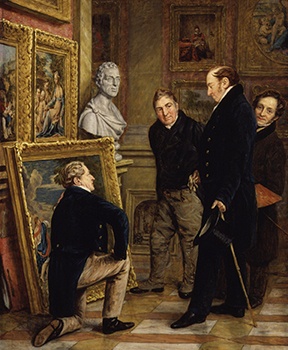
(Image: Pieter Christoffel Wonder [Public domain] , via Wikimedia Commons)

Too Offensive
With this potential mistake, you run the risk of showing a lack of self-awareness or the ability to be open to new ideas . Remember, no reader wants to be lectured at. If that's what your essay does, you are demonstrating an inability to communicate successfully with others.
Also, remember that no college is eager to admit someone who is too close-minded to benefit from being taught by others. A long, one-sided essay about a hot-button issue will suggest that you are exactly that.
- Ranting at length about political, religious, or other contentious topics. You simply don't know where the admissions officer who reads your essay stands on any of these issues. It's better to avoid upsetting or angering that person.
- Writing a one-sided diatribe about guns, abortion, the death penalty, immigration, or anything else in the news. Even if you can marshal facts in your argument, this essay is simply the wrong place to take a narrow, unempathetic side in an ongoing debate.
- Mentioning anything negative about the school you're applying to. Again, your reader is someone who works there and presumably is proud of the place. This is not the time to question the admissions officer's opinions or life choices.

College Essay Execution Problems To Avoid
Bad college essays aren't only caused by bad topics. Sometimes, even if you're writing about an interesting, relevant topic, you can still seem immature or unready for college life because of the way you present that topic—the way you actually write your personal statement. Check to make sure you haven't made any of the common mistakes on this list.
Tone-Deafness
Admissions officers are looking for resourcefulness, the ability to be resilient, and an active and optimistic approach to life —these are all qualities that create a thriving college student. Essays that don't show these qualities are usually suffering from tone-deafness.
- Being whiny or complaining about problems in your life. Is the essay about everyone doing things to/against you? About things happening to you, rather than you doing anything about them? That perspective is a definite turn-off.
- Trying and failing to use humor. You may be very funny in real life, but it's hard to be successfully funny in this context, especially when writing for a reader who doesn't know you. If you do want to use humor, I'd recommend the simplest and most straightforward version: being self-deprecating and low-key.
- Talking down to the reader, or alternately being self-aggrandizing. No one enjoys being condescended to. In this case, much of the function of your essay is to charm and make yourself likable, which is unlikely to happen if you adopt this tone.
- Being pessimistic, cynical, and generally depressive. You are applying to college because you are looking forward to a future of learning, achievement, and self-actualization. This is not the time to bust out your existential ennui and your jaded, been-there-done-that attitude toward life.

(Image: Eduard Munch [Public Domain] , via Wikimedia Commons)
Lack of Personality
One good question to ask yourself is: could anyone else have written this essay ? If the answer is yes, then you aren't doing a good job of representing your unique perspective on the world. It's very important to demonstrate your ability to be a detailed observer of the world, since that will be one of your main jobs as a college student.
- Avoiding any emotions, and appearing robot-like and cold in the essay. Unlike essays that you've been writing for class, this essay is meant to be a showcase of your authorial voice and personality. It may seem strange to shift gears after learning how to take yourself out of your writing, but this is the place where you have to put as much as yourself in as possible.
- Skipping over description and specific details in favor of writing only in vague generalities. Does your narrative feel like a newspaper horoscope, which could apply to every other person who was there that day? Then you're doing it wrong and need to refocus on your reaction, feelings, understanding, and transformation.

Off-Kilter Style
There's some room for creativity here, yes, but a college essay isn't a free-for-all postmodern art class . True, there are prompts that specifically call for your most out-of-left-field submission, or allow you to submit a portfolio or some other work sample instead of a traditional essay. But on a standard application, it's better to stick to traditional prose, split into paragraphs, further split into sentences.
- Submitting anything other than just the materials asked for on your application. Don't send food to the admissions office, don't write your essay on clothing or shoes, don't create a YouTube channel about your undying commitment to the school. I know there are a lot of urban legends about "that one time this crazy thing worked," but they are either not true or about something that will not work a second time.
- Writing your essay in verse, in the form of a play, in bullet points, as an acrostic, or any other non-prose form. Unless you really have a way with poetry or playwriting, and you are very confident that you can meet the demands of the prompt and explain yourself well in this form, don't discard prose simply for the sake of being different.
- Using as many "fancy" words as possible and getting very far away from sounding like yourself. Admissions officers are unanimous in wanting to hear your not fully formed teenage voice in your essay. This means that you should write at the top of your vocabulary range and syntax complexity, but don't trade every word up for a thesaurus synonym. Your essay will suffer for it.

Failure to Proofread
Most people have a hard time checking over their own work. This is why you have to make sure that someone else proofreads your writing . This is the one place where you can, should—and really must—get someone who knows all about grammar, punctuation and has a good eye for detail to take a red pencil to your final draft.
Otherwise, you look like you either don't know the basic rules or writing (in which case, are you really ready for college work?) or don't care enough to present yourself well (in which case, why would the admissions people care about admitting you?).
- Typos, grammatical mistakes, punctuation flubs, weird font/paragraph spacing issues. It's true that these are often unintentional mistakes. But caring about getting it right is a way to demonstrate your work ethic and dedication to the task at hand.
- Going over the word limit. Part of showing your brilliance is being able to work within arbitrary rules and limitations. Going over the word count points to a lack of self-control, which is not a very attractive feature in a college applicant.
- Repeating the same word(s) or sentence structure over and over again. This makes your prose monotonous and hard to read.

Bad College Essay Examples—And How to Fix Them
The beauty of writing is that you get to rewrite. So if you think of your essay as a draft waiting to be revised into a better version rather than as a precious jewel that can't bear being touched, you'll be in far better shape to correct the issues that always crop up!
Now let's take a look at some actual college essay drafts to see where the writer is going wrong and how the issue could be fixed.
Essay #1: The "I Am Writing This Essay as We Speak" Meta-Narrative
Was your childhood home destroyed by a landspout tornado? Yeah, neither was mine. I know that intro might have given the impression that this college essay will be about withstanding disasters, but the truth is that it isn't about that at all.
In my junior year, I always had in mind an image of myself finishing the college essay months before the deadline. But as the weeks dragged on and the deadline drew near, it soon became clear that at the rate things are going I would probably have to make new plans for my October, November and December.
Falling into my personal wormhole, I sat down with my mom to talk about colleges. "Maybe you should write about Star Trek ," she suggested, "you know how you've always been obsessed with Captain Picard, calling him your dream mentor. Unique hobbies make good topics, right? You'll sound creative!" I played with the thought in my mind, tapping my imaginary communicator pin and whispering "Computer. Tea. Earl Grey. Hot. And then an Essay." Nothing happened. Instead, I sat quietly in my room wrote the old-fashioned way. Days later I emerged from my room disheveled, but to my dismay, this college essay made me sound like just a guy who can't get over the fact that he'll never take the Starfleet Academy entrance exam. So, I tossed my essay away without even getting to disintegrate it with a phaser set on stun.
I fell into a state of panic. My college essay. My image of myself in senior year. Almost out of nowhere, Robert Jameson Smith offered his words of advice. Perfect! He suggested students begin their college essay by listing their achievements and letting their essay materialize from there. My heart lifted, I took his advice and listed three of my greatest achievements - mastering my backgammon strategy, being a part of TREE in my sophomore year, and performing "I Am the Very Model of a Modern Major-General" from The Pirates of Penzance in public. And sure enough, I felt inspiration hit me and began to type away furiously into the keyboard about my experience in TREE, or Trees Require Engaged Environmentalists. I reflected on the current state of deforestation, and described the dichotomy of it being both understandable why farmers cut down forests for farmland, and how dangerous this is to our planet. Finally, I added my personal epiphany to the end of my college essay as the cherry on the vanilla sundae, as the overused saying goes.
After 3 weeks of figuring myself out, I have converted myself into a piece of writing. As far as achievements go, this was definitely an amazing one. The ability to transform a human being into 603 words surely deserves a gold medal. Yet in this essay, I was still being nagged by a voice that couldn't be ignored. Eventually, I submitted to that yelling inner voice and decided that this was not the right essay either.
In the middle of a hike through Philadelphia's Fairmount Park, I realized that the college essay was nothing more than an embodiment of my character. The two essays I have written were not right because they have failed to become more than just words on recycled paper. The subject failed to come alive. Certainly my keen interest in Star Trek and my enthusiasm for TREE are a great part of who I am, but there were other qualities essential in my character that did not come across in the essays.
With this realization, I turned around as quickly as I could without crashing into a tree.
What Essay #1 Does Well
Here are all things that are working on all cylinders for this personal statement as is.
Killer First Sentence
Was your childhood home destroyed by a landspout tornado? Yeah, neither was mine.
- A strange fact. There are different kinds of tornadoes? What is a "landspout tornado" anyway?
- A late-night-deep-thoughts hypothetical. What would it be like to be a kid whose house was destroyed in this unusual way?
- Direct engagement with the reader. Instead of asking "what would it be like to have a tornado destroy a house" it asks "was your house ever destroyed."
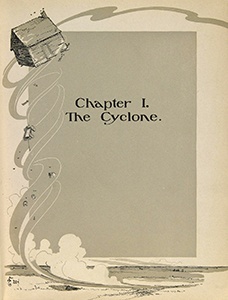
Gentle, Self-Deprecating Humor That Lands Well
I played with the thought in my mind, tapping my imaginary communicator pin and whispering "Computer. Tea. Earl Grey. Hot. And then an Essay." Nothing happened. Instead, I sat quietly in my room wrote the old-fashioned way. Days later I emerged from my room disheveled, but to my dismay, this college essay made me sound like just a guy who can't get over the fact that he'll never take the Starfleet Academy entrance exam. So, I tossed my essay away without even getting to disintegrate it with a phaser set on stun.
The author has his cake and eats it too here: both making fun of himself for being super into the Star Trek mythos, but also showing himself being committed enough to try whispering a command to the Enterprise computer alone in his room. You know, just in case.
A Solid Point That Is Made Paragraph by Paragraph
The meat of the essay is that the two versions of himself that the author thought about portraying each fails in some way to describe the real him. Neither an essay focusing on his off-beat interests, nor an essay devoted to his serious activism could capture everything about a well-rounded person in 600 words.

(Image: fir0002 via Wikimedia Commons .)
Where Essay #1 Needs Revision
Rewriting these flawed parts will make the essay shine.
Spending Way Too Long on the Metanarrative
I know that intro might have given the impression that this college essay will be about withstanding disasters, but the truth is that it isn't about that at all.
After 3 weeks of figuring myself out, I have converted myself into a piece of writing. As far as achievements go, this was definitely an amazing one. The ability to transform a human being into 603 words surely deserves a gold medal.
Look at how long and draggy these paragraphs are, especially after that zippy opening. Is it at all interesting to read about how someone else found the process of writing hard? Not really, because this is a very common experience.
In the rewrite, I'd advise condensing all of this to maybe a sentence to get to the meat of the actual essay .
Letting Other People Do All the Doing
I sat down with my mom to talk about colleges. "Maybe you should write about Star Trek ," she suggested, "you know how you've always been obsessed with Captain Picard, calling him your dream mentor. Unique hobbies make good topics, right? You'll sound creative!"
Almost out of nowhere, Robert Jameson Smith offered his words of advice. Perfect! He suggested students begin their college essay by listing their achievements and letting their essay materialize from there.
Twice in the essay, the author lets someone else tell him what to do. Not only that, but it sounds like both of the "incomplete" essays were dictated by the thoughts of other people and had little to do with his own ideas, experiences, or initiative.
In the rewrite, it would be better to recast both the Star Trek and the TREE versions of the essay as the author's own thoughts rather than someone else's suggestions . This way, the point of the essay—taking apart the idea that a college essay could summarize life experience—is earned by the author's two failed attempts to write that other kind of essay.

Leaving the Insight and Meaning Out of His Experiences
Both the Star Trek fandom and the TREE activism were obviously important life experiences for this author—important enough to be potential college essay topic candidates. But there is no description of what the author did with either one, nor any explanation of why these were so meaningful to his life.
It's fine to say that none of your achievements individually define you, but in order for that to work, you have to really sell the achievements themselves.
In the rewrite, it would be good to explore what he learned about himself and the world by pursuing these interests . How did they change him or seen him into the person he is today?
Not Adding New Shades and Facets of Himself Into the Mix
So, I tossed my essay away without even getting to disintegrate it with a phaser set on stun.
Yet in this essay, I was still being nagged by a voice that couldn't be ignored. Eventually, I submitted to that yelling inner voice and decided that this was not the right essay either.
In both of these passages, there is the perfect opportunity to point out what exactly these failed versions of the essay didn't capture about the author . In the next essay draft, I would suggest subtly making a point about his other qualities.
For example, after the Star Trek paragraph, he could talk about other culture he likes to consume, especially if he can discuss art forms he is interested in that would not be expected from someone who loves Star Trek .
Or, after the TREE paragraph, the author could explain why this second essay was no better at capturing him than the first. What was missing? Why is the self in the essay shouting—is it because this version paints him as an overly aggressive activist?

Essay #2: The "I Once Saw Poor People" Service Trip Essay
Unlike other teenagers, I'm not concerned about money, or partying, or what others think of me. Unlike other eighteen year-olds, I think about my future, and haven't become totally materialistic and acquisitive. My whole outlook on life changed after I realized that my life was just being handed to me on a silver spoon, and yet there were those in the world who didn't have enough food to eat or place to live. I realized that the one thing that this world needed more than anything was compassion; compassion for those less fortunate than us.
During the summer of 2006, I went on a community service trip to rural Peru to help build an elementary school for kids there. I expected harsh conditions, but what I encountered was far worse. It was one thing to watch commercials asking for donations to help the unfortunate people in less developed countries, yet it was a whole different story to actually live it. Even after all this time, I can still hear babies crying from hunger; I can still see the filthy rags that they wore; I can still smell the stench of misery and hopelessness. But my most vivid memory was the moment I first got to the farming town. The conditions of it hit me by surprise; it looked much worse in real life than compared to the what our group leader had told us. Poverty to me and everyone else I knew was a foreign concept that people hear about on the news or see in documentaries. But this abject poverty was their life, their reality. And for the brief ten days I was there, it would be mine too. As all of this realization came at once, I felt overwhelmed by the weight of what was to come. Would I be able to live in the same conditions as these people? Would I catch a disease that no longer existed in the first world, or maybe die from drinking contaminated water? As these questions rolled around my already dazed mind, I heard a soft voice asking me in Spanish, "Are you okay? Is there anything I can do to make you feel better?" I looked down to see a small boy, around nine years of age, who looked starved, and cold, wearing tattered clothing, comforting me. These people who have so little were able to forget their own needs, and put those much more fortunate ahead of themselves. It was at that moment that I saw how selfish I had been. How many people suffered like this in the world, while I went about life concerned about nothing at all?
Thinking back on the trip, maybe I made a difference, maybe not. But I gained something much more important. I gained the desire to make the world a better place for others. It was in a small, poverty-stricken village in Peru that I finally realized that there was more to life than just being alive.
What Essay #2 Does Well
Let's first point out what this draft has going for it.
Clear Chronology
This is an essay that tries to explain a shift in perspective. There are different ways to structure this overarching idea, but a chronological approach that starts with an earlier opinion, describes a mind changing event, and ends with the transformed point of view is an easy and clear way to lay this potentially complex subject out.
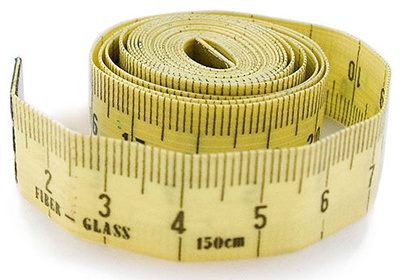
(Image: User:Lite via Wikimedia Commons)
Where Essay #2 Needs Revision
Now let's see what needs to be changed in order for this essay to pass muster.
Condescending, Obnoxious Tone
Unlike other teenagers, I'm not concerned about money, or partying, or what others think of me. Unlike other eighteen year-olds, I think about my future, and haven't become totally materialistic and acquisitive.
This is a very broad generalization, which doesn't tend to be the best way to formulate an argument—or to start an essay. It just makes this author sound dismissive of a huge swath of the population.
In the rewrite, this author would be way better off just concentrate on what she want to say about herself, not pass judgment on "other teenagers," most of whom she doesn't know and will never meet.
I realized that the one thing that this world needed more than anything was compassion; compassion for those less fortunate than us.
Coming from someone who hasn't earned her place in the world through anything but the luck of being born, the word "compassion" sounds really condescending. Calling others "less fortunate" when you're a senior in high school has a dehumanizing quality to it.
These people who have so little were able to forget their own needs, and put those much more fortunate in front of themselves.
Again, this comes across as very patronizing. Not only that, but to this little boy the author was clearly not looking all that "fortunate"—instead, she looked pathetic enough to need comforting.
In the next draft, a better hook could be making the essay about the many different kinds of shifting perspectives the author encountered on that trip . A more meaningful essay would compare and contrast the points of view of the TV commercials, to what the group leader said, to the author's own expectations, and finally to this child's point of view.

Vague, Unobservant Description
During the summer of 2006, I went on a community service trip to rural Peru to help build an elementary school for kids there. I expected harsh conditions, but what I encountered was far worse. It was one thing to watch commercials asking for donations to help the unfortunate people in less developed countries, yet it was a whole different story to actually live it. Even after all this time, I can still hear babies crying from hunger; I can still see the filthy rags that they wore; I can still smell the stench of misery and hopelessness.
Phrases like "cries of the small children from not having enough to eat" and "dirt stained rags" seem like descriptions, but they're really closer to incurious and completely hackneyed generalizations. Why were the kids were crying? How many kids? All the kids? One specific really loud kid?
The same goes for "filthy rags," which is both an incredibly insensitive way to talk about the clothing of these villagers, and again shows a total lack of interest in their life. Why were their clothes dirty? Were they workers or farmers so their clothes showing marks of labor? Did they have Sunday clothes? Traditional clothes they would put on for special occasions? Did they make their own clothes? That would be a good reason to keep wearing clothing even if it had "stains" on it.
The rewrite should either make this section more specific and less reliant on cliches, or should discard it altogether .
The conditions of it hit me by surprise; it looked much worse in real life than compared to the what our group leader had told us. Poverty to me and everyone else I knew was a foreign concept that people hear about on the news or see in documentaries. But this abject poverty was their life, their reality.
If this is the "most vivid memory," then I would expect to read all the details that have been seared into the author's brain. What did their leader tell them? What was different in real life? What was the light like? What did the houses/roads/grass/fields/trees/animals/cars look like? What time of day was it? Did they get there by bus, train, or plane? Was there an airport/train station/bus terminal? A city center? Shops? A marketplace?
There are any number of details to include here when doing another drafting pass.

Lack of Insight or Maturity
But this abject poverty was their life, their reality. And for the brief ten days I was there, it would be mine too. As all of this realization came at once, I felt overwhelmed by the weight of what was to come. Would I be able to live in the same conditions as these people? Would I catch a disease that no longer existed in the first world, or maybe die from drinking contaminated water?
Without a framing device explaining that this initial panic was an overreaction, this section just makes the author sound whiny, entitled, melodramatic, and immature . After all, this isn't a a solo wilderness trek—the author is there with a paid guided program. Just how much mortality is typically associated with these very standard college-application-boosting service trips?
In a rewrite, I would suggest including more perspective on the author's outsized and overprivileged response here. This would fit well with a new focus on the different points of view on this village the author encountered.
Unearned, Clichéd "Deep Thoughts"
But I gained something much more important. I gained the desire to make the world a better place for others. It was in a small, poverty-stricken village in Peru that I finally realized that there was more to life than just being alive.
Is it really believable that this is what the author learned? There is maybe some evidence to suggest that the author was shaken somewhat out of a comfortable, materialistic existence. But what does "there is more to life than just being alive" even really mean? This conclusion is rather vague, and seems mostly a non sequitur.
In a rewrite, the essay should be completely reoriented to discuss how differently others see us than we see ourselves, pivoting on the experience of being pitied by someone who you thought was pitiable. Then, the new version can end by on a note of being better able to understand different points of view and other people's perspectives .

The Bottom Line
- Bad college essays have problems either with their topics or their execution.
- The essay is how admissions officers learn about your personality, point of view, and maturity level, so getting the topic right is a key factor in letting them see you as an aware, self-directed, open-minded applicant who is going to thrive in an environment of independence.
- The essay is also how admissions officers learn that you are writing at a ready-for-college level, so screwing up the execution shows that you either don't know how to write, or don't care enough to do it well.
- The main ways college essay topics go wrong is bad taste, bad judgment, and lack of self-awareness.
- The main ways college essays fail in their execution have to do with ignoring format, syntax, and genre expectations.
What's Next?
Want to read some excellent college essays now that you've seen some examples of flawed one? Take a look through our roundup of college essay examples published by colleges and then get help with brainstorming your perfect college essay topic .
Need some guidance on other parts of the application process? Check out our detailed, step-by-step guide to college applications for advice.
Are you considering taking the SAT or ACT again before you submit your application? Read about our famous test prep guides for hints and strategies for a better score.

Trending Now
How to Get Into Harvard and the Ivy League
How to Get a Perfect 4.0 GPA
How to Write an Amazing College Essay
What Exactly Are Colleges Looking For?
ACT vs. SAT: Which Test Should You Take?
When should you take the SAT or ACT?
Get Your Free

Find Your Target SAT Score
Free Complete Official SAT Practice Tests
How to Get a Perfect SAT Score, by an Expert Full Scorer
Score 800 on SAT Math
Score 800 on SAT Reading and Writing
How to Improve Your Low SAT Score
Score 600 on SAT Math
Score 600 on SAT Reading and Writing
Find Your Target ACT Score
Complete Official Free ACT Practice Tests
How to Get a Perfect ACT Score, by a 36 Full Scorer
Get a 36 on ACT English
Get a 36 on ACT Math
Get a 36 on ACT Reading
Get a 36 on ACT Science
How to Improve Your Low ACT Score
Get a 24 on ACT English
Get a 24 on ACT Math
Get a 24 on ACT Reading
Get a 24 on ACT Science
Stay Informed
Get the latest articles and test prep tips!

Anna scored in the 99th percentile on her SATs in high school, and went on to major in English at Princeton and to get her doctorate in English Literature at Columbia. She is passionate about improving student access to higher education.
Ask a Question Below
Have any questions about this article or other topics? Ask below and we'll reply!
Ultimate Guide to Writing Your College Essay
Tips for writing an effective college essay.
College admissions essays are an important part of your college application and gives you the chance to show colleges and universities your character and experiences. This guide will give you tips to write an effective college essay.
Want free help with your college essay?
UPchieve connects you with knowledgeable and friendly college advisors—online, 24/7, and completely free. Get 1:1 help brainstorming topics, outlining your essay, revising a draft, or editing grammar.
Writing a strong college admissions essay
Learn about the elements of a solid admissions essay.
Avoiding common admissions essay mistakes
Learn some of the most common mistakes made on college essays
Brainstorming tips for your college essay
Stuck on what to write your college essay about? Here are some exercises to help you get started.
How formal should the tone of your college essay be?
Learn how formal your college essay should be and get tips on how to bring out your natural voice.
Taking your college essay to the next level
Hear an admissions expert discuss the appropriate level of depth necessary in your college essay.
Student Stories
Student Story: Admissions essay about a formative experience
Get the perspective of a current college student on how he approached the admissions essay.
Student Story: Admissions essay about personal identity
Get the perspective of a current college student on how she approached the admissions essay.
Student Story: Admissions essay about community impact
Student story: admissions essay about a past mistake, how to write a college application essay, tips for writing an effective application essay, sample college essay 1 with feedback, sample college essay 2 with feedback.
This content is licensed by Khan Academy and is available for free at www.khanacademy.org.
This site uses various technologies, as described in our Privacy Policy, for personalization, measuring website use/performance, and targeted advertising, which may include storing and sharing information about your site visit with third parties. By continuing to use this website you consent to our Privacy Policy and Terms of Use .
We are experiencing sporadically slow performance in our online tools, which you may notice when working in your dashboard. Our team is fully engaged and actively working to improve your online experience. If you are experiencing a connectivity issue, we recommend you try again in 10-15 minutes. We will update this space when the issue is resolved.
Enter your email to unlock an extra $25 off an SAT or ACT program!
By submitting my email address. i certify that i am 13 years of age or older, agree to recieve marketing email messages from the princeton review, and agree to terms of use., crafting an unforgettable college essay.
Most selective colleges require you to submit an essay or personal statement as part of your application.

It may sound like a chore, and it will certainly take a substantial amount of work. But it's also a unique opportunity that can make a difference at decision time. Admissions committees put the most weight on your high school grades and your test scores . However, selective colleges receive applications from many worthy students with similar scores and grades—too many to admit. So they use your essay, along with your letters of recommendation and extracurricular activities , to find out what sets you apart from the other talented candidates.
Telling Your Story to Colleges
So what does set you apart?
You have a unique background, interests and personality. This is your chance to tell your story (or at least part of it). The best way to tell your story is to write a personal, thoughtful essay about something that has meaning for you. Be honest and genuine, and your unique qualities will shine through.
Admissions officers have to read an unbelievable number of college essays, most of which are forgettable. Many students try to sound smart rather than sounding like themselves. Others write about a subject that they don't care about, but that they think will impress admissions officers.
You don't need to have started your own business or have spent the summer hiking the Appalachian Trail. Colleges are simply looking for thoughtful, motivated students who will add something to the first-year class.
Tips for a Stellar College Application Essay
1. write about something that's important to you..
It could be an experience, a person, a book—anything that has had an impact on your life.
2. Don't just recount—reflect!
Anyone can write about how they won the big game or the summer they spent in Rome. When recalling these events, you need to give more than the play-by-play or itinerary. Describe what you learned from the experience and how it changed you.
Free SAT Practice Tests & Events
Evaluate and improve your SAT score.
3. Being funny is tough.
A student who can make an admissions officer laugh never gets lost in the shuffle. But beware. What you think is funny and what an adult working in a college thinks is funny are probably different. We caution against one-liners, limericks and anything off–color.
4. Start early and write several drafts.
Set it aside for a few days and read it again. Put yourself in the shoes of an admissions officer: Is the essay interesting? Do the ideas flow logically? Does it reveal something about the applicant? Is it written in the applicant’s own voice?
5. No repeats.
What you write in your application essay or personal statement should not contradict any other part of your application–nor should it repeat it. This isn't the place to list your awards or discuss your grades or test scores.
6. Answer the question being asked.
Don't reuse an answer to a similar question from another application.
7. Have at least one other person edit your essay.
A teacher or college counselor is your best resource. And before you send it off, check, check again, and then triple check to make sure your essay is free of spelling or grammar errors.
Read More: 2018-2019 Common Application Essay Prompts (and How to Answer Them)

Test Your College Knowledge
How well do you understand the college admissions process? Find out with our quiz.
Take the Quiz

Explore Colleges For You
Connect with our featured colleges to find schools that both match your interests and are looking for students like you.

Career Quiz
Take our short quiz to learn which is the right career for you.

Get Started on Athletic Scholarships & Recruiting!
Join athletes who were discovered, recruited & often received scholarships after connecting with NCSA's 42,000 strong network of coaches.

Best 389 Colleges
165,000 students rate everything from their professors to their campus social scene.
SAT Prep Courses
1400+ course, act prep courses, free sat practice test & events, 1-800-2review, free digital sat prep try our self-paced plus program - for free, get a 14 day trial.

Free MCAT Practice Test
I already know my score.

MCAT Self-Paced 14-Day Free Trial

Enrollment Advisor
1-800-2REVIEW (800-273-8439) ext. 1
1-877-LEARN-30
Mon-Fri 9AM-10PM ET
Sat-Sun 9AM-8PM ET
Student Support
1-800-2REVIEW (800-273-8439) ext. 2
Mon-Fri 9AM-9PM ET
Sat-Sun 8:30AM-5PM ET
Partnerships
- Teach or Tutor for Us
College Readiness
International
Advertising
Affiliate/Other
- Enrollment Terms & Conditions
- Accessibility
- Cigna Medical Transparency in Coverage
Register Book
Local Offices: Mon-Fri 9AM-6PM
- SAT Subject Tests
Academic Subjects
- Social Studies
Find the Right College
- College Rankings
- College Advice
- Applying to College
- Financial Aid
School & District Partnerships
- Professional Development
- Advice Articles
- Private Tutoring
- Mobile Apps
- International Offices
- Work for Us
- Affiliate Program
- Partner with Us
- Advertise with Us
- International Partnerships
- Our Guarantees
- Accessibility – Canada
Privacy Policy | CA Privacy Notice | Do Not Sell or Share My Personal Information | Your Opt-Out Rights | Terms of Use | Site Map
©2024 TPR Education IP Holdings, LLC. All Rights Reserved. The Princeton Review is not affiliated with Princeton University
TPR Education, LLC (doing business as “The Princeton Review”) is controlled by Primavera Holdings Limited, a firm owned by Chinese nationals with a principal place of business in Hong Kong, China.
Have a language expert improve your writing
Check your paper for plagiarism in 10 minutes, generate your apa citations for free.
- Knowledge Base
- College essay
How to Write a College Essay | A Complete Guide & Examples
The college essay can make or break your application. It’s your chance to provide personal context, communicate your values and qualities, and set yourself apart from other students.
A standout essay has a few key ingredients:
- A unique, personal topic
- A compelling, well-structured narrative
- A clear, creative writing style
- Evidence of self-reflection and insight
To achieve this, it’s crucial to give yourself enough time for brainstorming, writing, revision, and feedback.
In this comprehensive guide, we walk you through every step in the process of writing a college admissions essay.
Table of contents
Why do you need a standout essay, start organizing early, choose a unique topic, outline your essay, start with a memorable introduction, write like an artist, craft a strong conclusion, revise and receive feedback, frequently asked questions.
While most of your application lists your academic achievements, your college admissions essay is your opportunity to share who you are and why you’d be a good addition to the university.
Your college admissions essay accounts for about 25% of your application’s total weight一and may account for even more with some colleges making the SAT and ACT tests optional. The college admissions essay may be the deciding factor in your application, especially for competitive schools where most applicants have exceptional grades, test scores, and extracurriculars.
What do colleges look for in an essay?
Admissions officers want to understand your background, personality, and values to get a fuller picture of you beyond your test scores and grades. Here’s what colleges look for in an essay :
- Demonstrated values and qualities
- Vulnerability and authenticity
- Self-reflection and insight
- Creative, clear, and concise writing skills
Prevent plagiarism. Run a free check.
It’s a good idea to start organizing your college application timeline in the summer of your junior year to make your application process easier. This will give you ample time for essay brainstorming, writing, revision, and feedback.
While timelines will vary for each student, aim to spend at least 1–3 weeks brainstorming and writing your first draft and at least 2–4 weeks revising across multiple drafts. Remember to leave enough time for breaks in between each writing and editing stage.
Create an essay tracker sheet
If you’re applying to multiple schools, you will have to juggle writing several essays for each one. We recommend using an essay tracker spreadsheet to help you visualize and organize the following:
- Deadlines and number of essays needed
- Prompt overlap, allowing you to write one essay for similar prompts
You can build your own essay tracker using our free Google Sheets template.
College essay tracker template
Ideally, you should start brainstorming college essay topics the summer before your senior year. Keep in mind that it’s easier to write a standout essay with a unique topic.
If you want to write about a common essay topic, such as a sports injury or volunteer work overseas, think carefully about how you can make it unique and personal. You’ll need to demonstrate deep insight and write your story in an original way to differentiate it from similar essays.
What makes a good topic?
- Meaningful and personal to you
- Uncommon or has an unusual angle
- Reveals something different from the rest of your application
Brainstorming questions
You should do a comprehensive brainstorm before choosing your topic. Here are a few questions to get started:
- What are your top five values? What lived experiences demonstrate these values?
- What adjectives would your friends and family use to describe you?
- What challenges or failures have you faced and overcome? What lessons did you learn from them?
- What makes you different from your classmates?
- What are some objects that represent your identity, your community, your relationships, your passions, or your goals?
- Whom do you admire most? Why?
- What three people have significantly impacted your life? How did they influence you?
How to identify your topic
Here are two strategies for identifying a topic that demonstrates your values:
- Start with your qualities : First, identify positive qualities about yourself; then, brainstorm stories that demonstrate these qualities.
- Start with a story : Brainstorm a list of memorable life moments; then, identify a value shown in each story.
After choosing your topic, organize your ideas in an essay outline , which will help keep you focused while writing. Unlike a five-paragraph academic essay, there’s no set structure for a college admissions essay. You can take a more creative approach, using storytelling techniques to shape your essay.
Two common approaches are to structure your essay as a series of vignettes or as a single narrative.
Vignettes structure
The vignette, or montage, structure weaves together several stories united by a common theme. Each story should demonstrate one of your values or qualities and conclude with an insight or future outlook.
This structure gives the admissions officer glimpses into your personality, background, and identity, and shows how your qualities appear in different areas of your life.
Topic: Museum with a “five senses” exhibit of my experiences
- Introduction: Tour guide introduces my museum and my “Making Sense of My Heritage” exhibit
- Story: Racial discrimination with my eyes
- Lesson: Using my writing to document truth
- Story: Broadway musical interests
- Lesson: Finding my voice
- Story: Smells from family dinner table
- Lesson: Appreciating home and family
- Story: Washing dishes
- Lesson: Finding moments of peace in busy schedule
- Story: Biking with Ava
- Lesson: Finding pleasure in job well done
- Conclusion: Tour guide concludes tour, invites guest to come back for “fall College Collection,” featuring my search for identity and learning.
Single story structure
The single story, or narrative, structure uses a chronological narrative to show a student’s character development over time. Some narrative essays detail moments in a relatively brief event, while others narrate a longer journey spanning months or years.
Single story essays are effective if you have overcome a significant challenge or want to demonstrate personal development.
Topic: Sports injury helps me learn to be a better student and person
- Situation: Football injury
- Challenge: Friends distant, teachers don’t know how to help, football is gone for me
- Turning point: Starting to like learning in Ms. Brady’s history class; meeting Christina and her friends
- My reactions: Reading poetry; finding shared interest in poetry with Christina; spending more time studying and with people different from me
- Insight: They taught me compassion and opened my eyes to a different lifestyle; even though I still can’t play football, I’m starting a new game
Brainstorm creative insights or story arcs
Regardless of your essay’s structure, try to craft a surprising story arc or original insights, especially if you’re writing about a common topic.
Never exaggerate or fabricate facts about yourself to seem interesting. However, try finding connections in your life that deviate from cliché storylines and lessons.
| Common insight | Unique insight |
|---|---|
| Making an all-state team → outstanding achievement | Making an all-state team → counting the cost of saying “no” to other interests |
| Making a friend out of an enemy → finding common ground, forgiveness | Making a friend out of an enemy → confront toxic thinking and behavior in yourself |
| Choir tour → a chance to see a new part of the world | Choir tour → a chance to serve in leading younger students |
| Volunteering → learning to help my community and care about others | Volunteering → learning to be critical of insincere resume-building |
| Turning a friend in for using drugs → choosing the moral high ground | Turning a friend in for using drugs → realizing the hypocrisy of hiding your secrets |
Admissions officers read thousands of essays each year, and they typically spend only a few minutes reading each one. To get your message across, your introduction , or hook, needs to grab the reader’s attention and compel them to read more..
Avoid starting your introduction with a famous quote, cliché, or reference to the essay itself (“While I sat down to write this essay…”).
While you can sometimes use dialogue or a meaningful quotation from a close family member or friend, make sure it encapsulates your essay’s overall theme.
Find an original, creative way of starting your essay using the following two methods.
Option 1: Start with an intriguing hook
Begin your essay with an unexpected statement to pique the reader’s curiosity and compel them to carefully read your essay. A mysterious introduction disarms the reader’s expectations and introduces questions that can only be answered by reading more.
Option 2: Start with vivid imagery
Illustrate a clear, detailed image to immediately transport your reader into your memory. You can start in the middle of an important scene or describe an object that conveys your essay’s theme.
A college application essay allows you to be creative in your style and tone. As you draft your essay, try to use interesting language to enliven your story and stand out .
Show, don’t tell
“Tell” in writing means to simply state a fact: “I am a basketball player.” “ Show ” in writing means to use details, examples, and vivid imagery to help the reader easily visualize your memory: “My heart races as I set up to shoot一two seconds, one second一and score a three-pointer!”
First, reflect on every detail of a specific image or scene to recall the most memorable aspects.
- What are the most prominent images?
- Are there any particular sounds, smells, or tastes associated with this memory?
- What emotion or physical feeling did you have at that time?
Be vulnerable to create an emotional response
You don’t have to share a huge secret or traumatic story, but you should dig deep to express your honest feelings, thoughts, and experiences to evoke an emotional response. Showing vulnerability demonstrates humility and maturity. However, don’t exaggerate to gain sympathy.
Use appropriate style and tone
Make sure your essay has the right style and tone by following these guidelines:
- Use a conversational yet respectful tone: less formal than academic writing, but more formal than texting your friends.
- Prioritize using “I” statements to highlight your perspective.
- Write within your vocabulary range to maintain an authentic voice.
- Write concisely, and use the active voice to keep a fast pace.
- Follow grammar rules (unless you have valid stylistic reasons for breaking them).
You should end your college essay with a deep insight or creative ending to leave the reader with a strong final impression. Your college admissions essay should avoid the following:
- Summarizing what you already wrote
- Stating your hope of being accepted to the school
- Mentioning character traits that should have been illustrated in the essay, such as “I’m a hard worker”
Here are two strategies to craft a strong conclusion.
Option 1: Full circle, sandwich structure
The full circle, or sandwich, structure concludes the essay with an image, idea, or story mentioned in the introduction. This strategy gives the reader a strong sense of closure.
In the example below, the essay concludes by returning to the “museum” metaphor that the writer opened with.
Option 2: Revealing your insight
You can use the conclusion to show the insight you gained as a result of the experiences you’ve described. Revealing your main message at the end creates suspense and keeps the takeaway at the forefront of your reader’s mind.
Revise your essay before submitting it to check its content, style, and grammar. Get feedback from no more than two or three people.
It’s normal to go through several rounds of revision, but take breaks between each editing stage.
Also check out our college essay examples to see what does and doesn’t work in an essay and the kinds of changes you can make to improve yours.
Respect the word count
Most schools specify a word count for each essay , and you should stay within 10% of the upper limit.
Remain under the specified word count limit to show you can write concisely and follow directions. However, don’t write too little, which may imply that you are unwilling or unable to write a thoughtful and developed essay.
Check your content, style, and grammar
- First, check big-picture issues of message, flow, and clarity.
- Then, check for style and tone issues.
- Finally, focus on eliminating grammar and punctuation errors.
Get feedback
Get feedback from 2–3 people who know you well, have good writing skills, and are familiar with college essays.
- Teachers and guidance counselors can help you check your content, language, and tone.
- Friends and family can check for authenticity.
- An essay coach or editor has specialized knowledge of college admissions essays and can give objective expert feedback.
The checklist below helps you make sure your essay ticks all the boxes.
College admissions essay checklist
I’ve organized my essay prompts and created an essay writing schedule.
I’ve done a comprehensive brainstorm for essay topics.
I’ve selected a topic that’s meaningful to me and reveals something different from the rest of my application.
I’ve created an outline to guide my structure.
I’ve crafted an introduction containing vivid imagery or an intriguing hook that grabs the reader’s attention.
I’ve written my essay in a way that shows instead of telling.
I’ve shown positive traits and values in my essay.
I’ve demonstrated self-reflection and insight in my essay.
I’ve used appropriate style and tone .
I’ve concluded with an insight or a creative ending.
I’ve revised my essay , checking my overall message, flow, clarity, and grammar.
I’ve respected the word count , remaining within 10% of the upper word limit.
Congratulations!
It looks like your essay ticks all the boxes. A second pair of eyes can help you take it to the next level – Scribbr's essay coaches can help.
Colleges want to be able to differentiate students who seem similar on paper. In the college application essay , they’re looking for a way to understand each applicant’s unique personality and experiences.
Your college essay accounts for about 25% of your application’s weight. It may be the deciding factor in whether you’re accepted, especially for competitive schools where most applicants have exceptional grades, test scores, and extracurricular track records.
A standout college essay has several key ingredients:
- A unique, personally meaningful topic
- A memorable introduction with vivid imagery or an intriguing hook
- Specific stories and language that show instead of telling
- Vulnerability that’s authentic but not aimed at soliciting sympathy
- Clear writing in an appropriate style and tone
- A conclusion that offers deep insight or a creative ending
While timelines will differ depending on the student, plan on spending at least 1–3 weeks brainstorming and writing the first draft of your college admissions essay , and at least 2–4 weeks revising across multiple drafts. Don’t forget to save enough time for breaks between each writing and editing stage.
You should already begin thinking about your essay the summer before your senior year so that you have plenty of time to try out different topics and get feedback on what works.
Most college application portals specify a word count range for your essay, and you should stay within 10% of the upper limit to write a developed and thoughtful essay.
You should aim to stay under the specified word count limit to show you can follow directions and write concisely. However, don’t write too little, as it may seem like you are unwilling or unable to write a detailed and insightful narrative about yourself.
If no word count is specified, we advise keeping your essay between 400 and 600 words.
Is this article helpful?
Other students also liked.
- What Do Colleges Look For in an Essay? | Examples & Tips
- College Essay Format & Structure | Example Outlines
- How to Revise Your College Admissions Essay | Examples
More interesting articles
- Choosing Your College Essay Topic | Ideas & Examples
- College Essay Examples | What Works and What Doesn't
- Common App Essays | 7 Strong Examples with Commentary
- How Long Should a College Essay Be? | Word Count Tips
- How to Apply for College | Timeline, Templates & Checklist
- How to End a College Admissions Essay | 4 Winning Strategies
- How to Make Your College Essay Stand Out | Tips & Examples
- How to Research and Write a "Why This College?" Essay
- How to Write a College Essay Fast | Tips & Examples
- How to Write a Diversity Essay | Tips & Examples
- How to Write a Great College Essay Introduction | Examples
- How to Write a Scholarship Essay | Template & Example
- How to Write About Yourself in a College Essay | Examples
- Style and Tone Tips for Your College Essay | Examples
- US College Essay Tips for International Students
"I thought AI Proofreading was useless but.."
I've been using Scribbr for years now and I know it's a service that won't disappoint. It does a good job spotting mistakes”
Celebrating 150 years of Harvard Summer School. Learn about our history.
12 Strategies to Writing the Perfect College Essay
College admission committees sift through thousands of college essays each year. Here’s how to make yours stand out.
Pamela Reynolds
When it comes to deciding who they will admit into their programs, colleges consider many criteria, including high school grades, extracurricular activities, and ACT and SAT scores. But in recent years, more colleges are no longer considering test scores.
Instead, many (including Harvard through 2026) are opting for “test-blind” admission policies that give more weight to other elements in a college application. This policy change is seen as fairer to students who don’t have the means or access to testing, or who suffer from test anxiety.
So, what does this mean for you?
Simply that your college essay, traditionally a requirement of any college application, is more important than ever.
A college essay is your unique opportunity to introduce yourself to admissions committees who must comb through thousands of applications each year. It is your chance to stand out as someone worthy of a seat in that classroom.
A well-written and thoughtful essay—reflecting who you are and what you believe—can go a long way to separating your application from the slew of forgettable ones that admissions officers read. Indeed, officers may rely on them even more now that many colleges are not considering test scores.
Below we’ll discuss a few strategies you can use to help your essay stand out from the pack. We’ll touch on how to start your essay, what you should write for your college essay, and elements that make for a great college essay.
Be Authentic
More than any other consideration, you should choose a topic or point of view that is consistent with who you truly are.
Readers can sense when writers are inauthentic.
Inauthenticity could mean the use of overly flowery language that no one would ever use in conversation, or it could mean choosing an inconsequential topic that reveals very little about who you are.
Use your own voice, sense of humor, and a natural way of speaking.
Whatever subject you choose, make sure it’s something that’s genuinely important to you and not a subject you’ve chosen just to impress. You can write about a specific experience, hobby, or personality quirk that illustrates your strengths, but also feel free to write about your weaknesses.
Honesty about traits, situations, or a childhood background that you are working to improve may resonate with the reader more strongly than a glib victory speech.
Grab the Reader From the Start
You’ll be competing with so many other applicants for an admission officer’s attention.
Therefore, start your essay with an opening sentence or paragraph that immediately seizes the imagination. This might be a bold statement, a thoughtful quote, a question you pose, or a descriptive scene.
Starting your essay in a powerful way with a clear thesis statement can often help you along in the writing process. If your task is to tell a good story, a bold beginning can be a natural prelude to getting there, serving as a roadmap, engaging the reader from the start, and presenting the purpose of your writing.
Focus on Deeper Themes
Some essay writers think they will impress committees by loading an essay with facts, figures, and descriptions of activities, like wins in sports or descriptions of volunteer work. But that’s not the point.
College admissions officers are interested in learning more about who you are as a person and what makes you tick.
They want to know what has brought you to this stage in life. They want to read about realizations you may have come to through adversity as well as your successes, not just about how many games you won while on the soccer team or how many people you served at a soup kitchen.
Let the reader know how winning the soccer game helped you develop as a person, friend, family member, or leader. Make a connection with your soup kitchen volunteerism and how it may have inspired your educational journey and future aspirations. What did you discover about yourself?
Show Don’t Tell
As you expand on whatever theme you’ve decided to explore in your essay, remember to show, don’t tell.
The most engaging writing “shows” by setting scenes and providing anecdotes, rather than just providing a list of accomplishments and activities.
Reciting a list of activities is also boring. An admissions officer will want to know about the arc of your emotional journey too.
Try Doing Something Different
If you want your essay to stand out, think about approaching your subject from an entirely new perspective. While many students might choose to write about their wins, for instance, what if you wrote an essay about what you learned from all your losses?
If you are an especially talented writer, you might play with the element of surprise by crafting an essay that leaves the response to a question to the very last sentence.
You may want to stay away from well-worn themes entirely, like a sports-related obstacle or success, volunteer stories, immigration stories, moving, a summary of personal achievements or overcoming obstacles.
However, such themes are popular for a reason. They represent the totality of most people’s lives coming out of high school. Therefore, it may be less important to stay away from these topics than to take a fresh approach.
Explore Harvard Summer School’s College Programs for High School Students
Write With the Reader in Mind
Writing for the reader means building a clear and logical argument in which one thought flows naturally from another.
Use transitions between paragraphs.
Think about any information you may have left out that the reader may need to know. Are there ideas you have included that do not help illustrate your theme?
Be sure you can answer questions such as: Does what you have written make sense? Is the essay organized? Does the opening grab the reader? Is there a strong ending? Have you given enough background information? Is it wordy?
Write Several Drafts
Set your essay aside for a few days and come back to it after you’ve had some time to forget what you’ve written. Often, you’ll discover you have a whole new perspective that enhances your ability to make revisions.
Start writing months before your essay is due to give yourself enough time to write multiple drafts. A good time to start could be as early as the summer before your senior year when homework and extracurricular activities take up less time.
Read It Aloud
Writer’s tip : Reading your essay aloud can instantly uncover passages that sound clumsy, long-winded, or false.
Don’t Repeat
If you’ve mentioned an activity, story, or anecdote in some other part of your application, don’t repeat it again in your essay.
Your essay should tell college admissions officers something new. Whatever you write in your essay should be in philosophical alignment with the rest of your application.
Also, be sure you’ve answered whatever question or prompt may have been posed to you at the outset.
Ask Others to Read Your Essay
Be sure the people you ask to read your essay represent different demographic groups—a teacher, a parent, even a younger sister or brother.
Ask each reader what they took from the essay and listen closely to what they have to say. If anyone expresses confusion, revise until the confusion is cleared up.
Pay Attention to Form
Although there are often no strict word limits for college essays, most essays are shorter rather than longer. Common App, which students can use to submit to multiple colleges, suggests that essays stay at about 650 words.
“While we won’t as a rule stop reading after 650 words, we cannot promise that an overly wordy essay will hold our attention for as long as you’d hoped it would,” the Common App website states.
In reviewing other technical aspects of your essay, be sure that the font is readable, that the margins are properly spaced, that any dialogue is set off properly, and that there is enough spacing at the top. Your essay should look clean and inviting to readers.
End Your Essay With a “Kicker”
In journalism, a kicker is the last punchy line, paragraph, or section that brings everything together.
It provides a lasting impression that leaves the reader satisfied and impressed by the points you have artfully woven throughout your piece.
So, here’s our kicker: Be concise and coherent, engage in honest self-reflection, and include vivid details and anecdotes that deftly illustrate your point.
While writing a fantastic essay may not guarantee you get selected, it can tip the balance in your favor if admissions officers are considering a candidate with a similar GPA and background.
Write, revise, revise again, and good luck!
Experience life on a college campus. Spend your summer at Harvard.
Explore Harvard Summer School’s College Programs for High School Students.
About the Author
Pamela Reynolds is a Boston-area feature writer and editor whose work appears in numerous publications. She is the author of “Revamp: A Memoir of Travel and Obsessive Renovation.”
How Involved Should Parents and Guardians Be in High School Student College Applications and Admissions?
There are several ways parents can lend support to their children during the college application process. Here's how to get the ball rolling.
Harvard Division of Continuing Education
The Division of Continuing Education (DCE) at Harvard University is dedicated to bringing rigorous academics and innovative teaching capabilities to those seeking to improve their lives through education. We make Harvard education accessible to lifelong learners from high school to retirement.

JLV College Counseling
20+ words to avoid writing in your essay.
Posted on March 13, 2018 by Jessica Velasco
2 Comments

Essays, assignments, admissions…
These words implicate the pain of students from all over the world, don’t you agree? They yet sound like a creepy snake whispering, “You shall not passsss!”
Most students hate writing essays. It’s difficult, time- and energy consuming, and challenging to complete them. A thesis, arguments, references, and conclusion are fundamental to every essay. But what makes yours stellar is words you use to convince readers. Words are your powerful weapon to prove critical thinking and knowledge of the topic. Words help you stand out in a crowd of other students writing about the same topics.
But here’s the problem:
Not all words are useful. Some are clunky and redundant , while others make your writing mumbling. Some you use for word count rather than meaning, and they make essays sound complicated yet empty.
For concise and meaningful writing, do your best to avoid these words and phrases in your admission essays.
1) Contractions
In essays, avoid abbreviations such as “ don’t ,” “ can’t ,” and “ won’t .” Academic works suppose using full words, so write them rather than contractions.
Set phrases enrich a language, but leave them for personal stories, blog posts, or fiction books. An admission essay is a task to check your skills of formal writing, not your ability to entertain or wow professors with flourished vocabulary. Stay clear and concise.
3-5) “ So on ,” “ etc ,” “ and so forth “
These run-on expressions demonstrate nothing but your inability to work with arguments, details, and examples. They scream, “I do not know what else to say!” Avoid them in your essays.
Phrases a la “ it’s an open secret ,” “ we all know ,” or “ sleep like a baby ” are clichés used so often that have lost relevance far long ago. They are a poor attempt to strike as clever, but such words sound false in sober fact.
7-11) “ Thing ,” “ stuff ,” “ good ,” “ bad ,” “ big “
The problem with these words is colloquiality and vagueness, inappropriate for academic language. It’s okay to use them in everyday talk; but when in essays, they sound too elementary and make admission officers think of your poor vocabulary. Do your best to master paraphrasing and synonymization for writing more sophisticated words in academic papers.
12) Slang, jargon, teen speak
Remember the audience. Even though admission officers might read Buzzfeed articles in spare time, they will hardly appreciate such writing style in your formal essay. Leave slang where it’s appropriate.
13) Rhetorical questions
Asking them, you assume that readers know the answer. But why then do they need this information? What’s its value? Rhetorical questions don’t expect explanations, which is inappropriate for academic writing. What seems evident to you might not be so for a reader, that is why you should provide clear statements in essays.
14-17) “ In terms of ,” “ needless to say ,” “ in conclusion ,” “ it goes without saying “
Parenthetic words bring no surplus value to your writings. They may serve as transitional phrases in informal works but become redundant when used in academic essays. Professors will consider it a trick to complete a word count rather than add value to your work.
Quoting and referencing are a must-have for academic essays, but this rule is about starting your work with a quote from a famous person. First, this trick is so overused that drives professors nuts; and second, they want to hear from you, not Hemingway, Musk, or Obama. It’s your essay, so its tone of voice and personality should be yours.
19-26) “ Very ,” “ quite ,” “ really ,” “ totally ,” “ already ,” “ fairly ,” “ actually ,” “ just “
All they are weak modifiers or redundant – ly adverbs with no meaning. When you need to write a 2,000-word essay, you might fight against the temptation to insert them; but the result will be poor because such words are irrelevant and bring no surplus value to the statements you use in essays. “ Very unique ,” “ really interesting ,” and “ quite enough ” have nothing to do with efficient academic writings.
27) Passive voice
Most educators ask students to avoid passive voice because this grammar construction 1) weakens wiring and 2) “ lacks explicit reference to who the actor is .” Use active voice to make all statements clear to readers.
When writing essays, let words be your allies. Use those powerful words to communicate your message to admission officers and overtake other students. Be concise, enhance your vocabulary, consider active verbs and clear sentence structure, and do not plagiarize ideas and texts from peers or online sources. Convey your skills and highlight strengths in your academic writings.
| on Twitter to find more works of hers. |
Share this:
- Click to share on Facebook (Opens in new window)
- Click to share on Twitter (Opens in new window)
- Click to share on Pinterest (Opens in new window)
- Click to share on LinkedIn (Opens in new window)
- Click to share on Tumblr (Opens in new window)
- Click to share on Pocket (Opens in new window)
- Click to share on Reddit (Opens in new window)
- Click to print (Opens in new window)
- Click to email a link to a friend (Opens in new window)
- Click to share on Telegram (Opens in new window)
- Click to share on WhatsApp (Opens in new window)
Category: College Essay Tags: college admission , College Essay , Essay , Guest Blog , Guest Post , Lesley Vos
2 Comments on “ 20+ Words to Avoid Writing in Your Essay ”
Pingback: What Words Are Excluded In A Word Count: Unveiling The Limits
what about if they essay is about a book?
Leave a comment Cancel reply
This site uses Akismet to reduce spam. Learn how your comment data is processed .
JLV College Counseling is reader supported. When you purchase through links on the site, I may earn an affiliate commission. Learn more here .
Follow Blog via Email
Enter your email address to follow this blog and receive notifications of new posts by email.
Email Address:
About Jessica
Buy me a coffee.

Book Pick of the Month

The link for the book is an affiliate link. You will not pay extra; however, I do receive a small reimbursement if you purchase through the links. Thank you for your support of JLV College Counseling.

Quick Links
Recent posts.
- Scholarship Saturday – August 24, 2024
- Scholarship Saturday – August 17, 2024
- Scholarship Saturday – August 10, 2024
Contact Jessica
Stay connected.
- View jlvcollegecounseling’s profile on Facebook
- View admissions411’s profile on Twitter
- View jlvcollegecounseling’s profile on Instagram
- View admissions411’s profile on Pinterest
- View velascojessica’s profile on LinkedIn
JLV College Counseling is reader supported. When you purchase through links on the site, I may earn an affiliate commission. Learn more here .
Create a website or blog at WordPress.com

- Already have a WordPress.com account? Log in now.
- Subscribe Subscribed
- Copy shortlink
- Report this content
- View post in Reader
- Manage subscriptions
- Collapse this bar
More From Forbes
How not to write your college essay.
- Share to Facebook
- Share to Twitter
- Share to Linkedin
If you are looking for the “secret formula” for writing a “winning” college essay, you have come to the wrong place. The reality is there is no silver bullet or strategy to write your way to an acceptance. There is not one topic or approach that will guarantee a favorable outcome.
At the end of the day, every admission office just wants to know more about you, what you value, and what excites you. They want to hear about your experiences through your own words and in your own voice. As you set out to write your essay, you will no doubt get input (both sought-after and unsolicited) on what to write. But how about what NOT Notcoin to write? There are avoidable blunders that applicants frequently make in drafting their essays. I asked college admission leaders, who have read thousands of submissions, to share their thoughts.
Don’t Go In There
There is wide consensus on this first one, so before you call on your Jedi mind tricks or predictive analytics, listen to the voices of a diverse range of admission deans. Peter Hagan, executive director of admissions at Syracuse University, sums it up best, saying, “I would recommend that students try not to get inside of our heads. He adds, “Too often the focus is on what they think we want.”
Andy Strickler, dean of admission and financial aid at Connecticut College agrees, warning, “Do NOT get caught in the trap of trying to figure out what is going to impress the admission committee. You have NO idea who is going to read your essay and what is going to connect with them. So, don't try to guess that.” Victoria Romero, vice president for enrollment, at Scripps College adds, “Do not write about something you don’t care about.” She says, “I think students try to figure out what an admission officer wants to read, and the reality is the reader begins every next essay with no expectations about the content THEY want to read.” Chrystal Russell, dean of admission at Hampden-Sydney College, agrees, saying, “If you're not interested in writing it, we will not be interested when reading it.” Jay Jacobs, vice provost for enrollment management at the University of Vermont elaborates, advising. “Don’t try to make yourself sound any different than you are.” He says, “The number one goal for admission officers is to better understand the applicant, what they like to do, what they want to do, where they spend the majority of their time, and what makes them tick. If a student stays genuine to that, it will shine through and make an engaging and successful essay.”
Best High-Yield Savings Accounts Of 2024
Best 5% interest savings accounts of 2024.
Don’t Be Artificial
The headlines about college admission are dominated by stories about artificial intelligence and the college essay. Let’s set some ground rules–to allow ChatGPT or some other tool to do your work is not only unethical, it is also unintelligent. The only worse mistake you could make is to let another human write your essay for you. Instead of preoccupying yourself with whether or not colleges are using AI detection software (most are not), spend your time focused on how best to express yourself authentically. Rick Clark is the executive director of strategic student success at Georgia Institute of Technology, one of the first institutions to clearly outline their AI policy for applicants. He says, “Much of a college application is devoted to lines, boxes, and numbers. Essays and supplements are the one place to establish connection, personality, and distinction. AI, in its current state, is terrible at all three.” He adds, “My hope is that students will use ChatGPT or other tools for brainstorming and to get started, but then move quickly into crafting an essay that will provide insight and value.”
Don’t Overdo It
Michael Stefanowicz, vice president for enrollment management at Landmark College says, “You can only cover so much detail about yourself in an admission essay, and a lot of students feel pressure to tell their life story or choose their most defining experience to date as an essay topic. Admission professionals know that you’re sharing just one part of your lived experience in the essay.” He adds, “Some of the favorite essays I’ve read have been episodic, reflecting on the way you’ve found meaning in a seemingly ordinary experience, advice you’ve lived out, a mistake you’ve learned from, or a special tradition in your life.” Gary Ross, vice president for admission and financial aid at Colgate University adds, “More than a few applicants each year craft essays that talk about the frustration and struggles they have experienced in identifying a topic for their college application essay. Presenting your college application essay as a smorgasbord of topics that ultimately landed on the cutting room floor does not give us much insight into an applicant.”
Don’t Believe In Magic
Jason Nevinger, senior director of admission at the University of Rochester warns, “Be skeptical of anyone or any company telling you, ‘This is the essay that got me into _____.’ There is no magic topic, approach, sentence structure, or prose that got any student into any institution ever.” Social media is littered with advertisements promising strategic essay help. Don’t waste your time, energy, or money trying to emulate a certain style, topic, or tone. Liz Cheron is chief executive officer for the Coalition for College and former assistant vice president of enrollment & dean of admissions at Northeastern University. She agrees with Nevinger, saying “Don't put pressure on yourself to find the perfect, slam dunk topic. The vast majority of college essays do exactly what they're supposed to do–they are well-written and tell the admission officer more about the student in that student's voice–and that can take many different forms.”
Don’t Over Recycle
Beatrice Atkinson-Myers, associate director of global recruitment at the University of California at Santa Cruz tells students, “Do not use the same response for each university; research and craft your essay to match the program at the university you are interested in studying. Don't waste time telling me things I can read elsewhere in your application. Use your essay to give the admissions officer insights into your motivations, interests, and thinking. Don't make your essay the kitchen sink, focus on one or two examples which demonstrate your depth and creativity.” Her UC colleague, Jim Rawlins, associate vice chancellor of enrollment management at the University of California at San Diego agrees, saying “Answer the question. Not doing so is the surest way we can tell you are simply giving us a snippet of something you actually wrote for a different purpose.”
Don’t Overedit
Emily Roper-Doten, vice president for undergraduate admissions and financial assistance at Clark University warns against “Too many editors!” She says, “Pick a couple of trusted folks to be your sounding board when considering topics and as readers once you have drafts. You don’t want too many voices in your essay to drown you out!” Scripps’ Romero agrees, suggesting, “Ask a good friend, someone you trust and knows you well, to read your essays.” She adds, “The goal is for the admission committee to get to know a little about you and who better to help you create that framework, than a good friend. This may not work for all students because of content but helps them understand it’s important to be themselves.” Whitney Soule, vice provost and dean of admissions at The University of Pennsylvania adds, “Avoid well-meaning editorial interference that might seem to polish your writing but actually takes your own personal ‘shine’ right out of the message.” She says, “As readers, we connect to applicants through their genuine tone and style. Considering editorial advice for flow and message is OK but hold on to the 'you' for what you want to say and how you want to say it.”
Don’t Get Showy
Palmer Muntz, senior regional admissions counselor at the University of Alaska Fairbanks cautions applicants, “Don’t be fancier than you are. You don’t need to put on airs.” He adds, “Yes, proofread your work for grammar and spelling, but be natural. Craft something you’d want to read yourself, which probably means keeping your paragraphs short, using familiar words, and writing in an active voice.” Connecticut College’s Strickler agrees, warning, “Don't try to be someone you are not. If you are not funny, don't try to write a funny essay. If you are not an intellectual, trying to write an intellectual essay is a bad idea.”
Anthony Jones, the vice president of enrollment management at Loyola University New Orleans offers a unique metaphor for thinking about the essay. He says, “In the new world of the hyper-fast college admission process, it's become easy to overlook the essential meaning of the college application. It's meant to reveal Y...O...U, the real you, not some phony digital avatar. Think of the essay as the essence of that voice but in analog. Like the completeness and authenticity captured in a vinyl record, the few lines you're given to explain your view should be a slow walk through unrestrained expression chock full of unapologetic nuances, crevices of emotion, and exactness about how you feel in the moment. Then, and only then, can you give the admissions officer an experience that makes them want to tune in and listen for more.”
Don’t Be A Downer
James Nondorf, vice president and dean of admissions and financial aid at The University of Chicago says, “Don’t be negative about other people, be appreciative of those who have supported you, and be excited about who you are and what you will bring to our campus!” He adds, “While admissions offices want smart students for our classrooms, we also want kind-hearted, caring, and joyous students who will add to our campus communities too.”
Don’t Pattern Match
Alan Ramirez is the dean of admission and financial aid at Sewanee, The University of the South. He explains, “A big concern I have is when students find themselves comparing their writing to other students or past applicants and transform their writing to be more like those individuals as a way to better their chances of offering a more-compelling essay.” He emphasizes that the result is that the “essay is no longer authentic nor the best representation of themselves and the whole point of the essay is lost. Their distinctive voice and viewpoint contribute to the range of voices in the incoming class, enhancing the diversity of perspectives we aim to achieve.” Ramirez simple tells students, “Be yourself, that’s what we want to see, plus there's no one else who can do it better than you!”
Don’t Feel Tied To A Topic
Jessica Ricker is the vice president for enrollment and dean of admissions and financial aid at Skidmore College. She says, “Sometimes students feel they must tell a story of grief or hardship, and then end up reliving that during the essay-writing process in ways that are emotionally detrimental. I encourage students to choose a topic they can reflect upon positively but recommend that if they choose a more challenging experience to write about, they avoid belaboring the details and instead focus on the outcome of that journey.” She adds, "They simply need to name it, frame its impact, and then help us as the reader understand how it has shaped their lens on life and their approach moving forward.”
Landmark College’s Stefanowicz adds, “A lot of students worry about how personal to get in sharing a part of their identity like your race or heritage (recalling last year’s Supreme Court case about race-conscious admissions), a learning difference or other disability, your religious values, LGBTQ identity…the list goes on.” He emphasizes, “This is always your choice, and your essay doesn’t have to be about a defining identity. But I encourage you to be fully yourself as you present yourself to colleges—because the college admission process is about finding a school where your whole self is welcome and you find a setting to flourish!”
Don’t Be Redundant
Hillen Grason Jr., dean of admission at Franklin & Marshall College, advises, “Don't repeat academic or co-curricular information that is easily identifiable within other parts of your application unless the topic is a core tenant of you as an individual.” He adds, “Use your essay, and other parts of your application, wisely. Your essay is the best way to convey who your authentic self is to the schools you apply. If you navigated a situation that led to a dip in your grades or co-curricular involvement, leverage the ‘additional information’ section of the application.
Thomas Marr is a regional manager of admissions for the Americas at The University of St Andrews in Scotland and points out that “Not all international schools use the main college essay as part of their assessment when reviewing student applications.” He says, “At the University of St Andrews, we focus on the supplemental essay and students should avoid the mistake of making the supplemental a repeat of their other essay. The supplemental (called the Personal Statement if using the UCAS application process) is to show the extent of their passion and enthusiasm for the subject/s to which they are applying and we expect about 75% of the content to cover this. They can use the remaining space to mention their interests outside of the classroom. Some students confuse passion for the school with passion for their subject; do not fall into that trap.”
A Few Final Don’ts
Don’t delay. Every college applicant I have ever worked with has wished they had started earlier. You can best avoid the pitfalls above if you give yourself the time and space to write a thoughtful essay and welcome feedback openly but cautiously. Don’t put too much pressure on yourself to be perfect . Do your best, share your voice, and stay true to who you are.

- Editorial Standards
- Reprints & Permissions
Join The Conversation
One Community. Many Voices. Create a free account to share your thoughts.
Forbes Community Guidelines
Our community is about connecting people through open and thoughtful conversations. We want our readers to share their views and exchange ideas and facts in a safe space.
In order to do so, please follow the posting rules in our site's Terms of Service. We've summarized some of those key rules below. Simply put, keep it civil.
Your post will be rejected if we notice that it seems to contain:
- False or intentionally out-of-context or misleading information
- Insults, profanity, incoherent, obscene or inflammatory language or threats of any kind
- Attacks on the identity of other commenters or the article's author
- Content that otherwise violates our site's terms.
User accounts will be blocked if we notice or believe that users are engaged in:
- Continuous attempts to re-post comments that have been previously moderated/rejected
- Racist, sexist, homophobic or other discriminatory comments
- Attempts or tactics that put the site security at risk
- Actions that otherwise violate our site's terms.
So, how can you be a power user?
- Stay on topic and share your insights
- Feel free to be clear and thoughtful to get your point across
- ‘Like’ or ‘Dislike’ to show your point of view.
- Protect your community.
- Use the report tool to alert us when someone breaks the rules.
Thanks for reading our community guidelines. Please read the full list of posting rules found in our site's Terms of Service.
University of Notre Dame
Undergraduate Admissions
Tips from Counselors
- Home ›
- Apply ›
- Tips from Counselors ›
Tackling the Personal Essay: Tips from a Notre Dame Admissions Counselor
Published: August 30, 2024
Author: Zach Klonsinski
If you ask almost any admissions professional which part of reading applications is their favorite, it’s likely their answer will be a resounding, “The essays!” Essays are where we get to engage with students’ hopes, fears, dreams, life experiences (and more) in their authentic voice. We are humbled every year getting to “meet” all the incredible young people who are applying to Notre Dame through their essays!
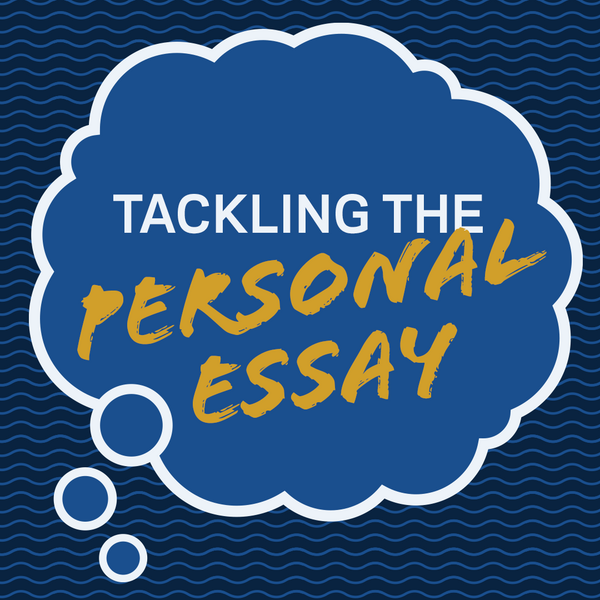
Yet, writing an essay introducing yourself can be really hard. Maybe you’ve never done so before, or you haven’t for a really long time, and often it will seem really awkward. That’s OK!
It feels hard because it is–or at least it can be.
Don’t worry, though! I love sharing tips with applicants about the personal essay that will hopefully help you see it as an opportunity to learn more about yourself and then share that discernment with the colleges who will be fortunate enough to receive your application!
Getting started
The easiest way to get started is by simply brainstorming! I love using pen and paper (I’m anti-pencil, though I realize that may be a divisive opinion). The physical materials help me feel less constrained by technology, though you may find the technology comforting.
Use bulleted lists or short phrases to capture ideas, life experiences, values, and more. Every day, set aside five minutes to write about yourself or your college discernment process without stopping to think. Where does your mind lead you when you get out of your own way?
Ask your friends and family to help you identify values that are important to you or things that make you.. well… you! Often it’s easier to highlight and say nice things about someone else than it is ourselves, so lean on those who know you well!
Group these collective nuggets to see if any patterns or stories emerge. Do you see any prompts on your application that align with your brainstorming? The Common Application, for example, has seven to choose from, including a make your own prompt! Start writing on one that makes you pause, as that means you might have something to say! Don’t be afraid to go longer than your word count or to use an atypical form of writing.
While that specific level of chaos may not work for you, I always recommend staying away from sentences and avoiding constraining yourself while writing because…
Editing is more than spelling and grammar!
When we want to “edit” something, it can be tempting to start–and just as quickly end–with spell check. (Yes, your essay should have proper spelling and grammar, but please know we are not reading your essay with a red pen “grading” every single comma.)
What is far more important–though also far more intimidating–is your essay’s content.
What really improved my writing actually had nothing to do with me–rather, it was finding trusted editors to give me honest and constructive feedback. While it’s tempting to have your best friend or family member read your essay, I’ve found my best editors possess a strong rhetorical mind, ask thoughtful questions, and are not afraid to tell me when something isn’t working the way I think it is.
This may describe someone close to you, but maybe not. Maybe there’s a classmate or teacher who you have always admired, even if you don’t know them that well. Editing is an incredibly vulnerable process; don’t be afraid to lean into that vulnerability! I promise that a strong editor who works with your voice and style–rather than rewriting your essay how they would have–will help bring forth an authentic essay you didn’t even realize you could write!
Speaking of, authenticity will lead to your best essay
The best application essay is the one that helps us get to know you. Period. Full stop. Any topic can be a good topic, any topic can be a bad topic. At the end of the day, the topic you choose to write about is only a gateway to help us get to know you!
Let’s think of it another way. Say you printed out your essay at your school, without your name or other identifying information on it, and someone who knows you picked it up and read it. If they said, “I bet this is (your name)’s essay,” I can already tell you’re on the right track. There’s something truly you about it!
Where can I find more about writing application essays?
I’m so glad you asked! On our On-Demand Sessions webpage , you can find a number of helpful recorded sessions from our College Application Workshop series. One of them, co-presented by yours truly, is called “Crafting the Perfect College Essay”. My colleague Maria Finan and I present our own tips and tricks for about 20 minutes and then take questions from a virtual audience for the remainder of the 45 minute session. I invite you to check it out, as well as the other sessions we have recorded!
Ready to Write Your App Essays? Advice from an Admissions Counselor on the Notre Dame Supplement

Zach Klonsinski is a senior assistant director with the Office of Undergraduate Admissions.
He is the regional counselor for Minnesota, Missouri (Kansas City), Wisconsin, Rwanda, Kenya, France, Portugal, Spain, Andorra, Monaco, and China - Beijing
- Read Zach's profile.


- 630 730 8825
How to End a College Essay: Six Strategies
Gina twardosz.
- Last Updated on August 22, 2024
Table of Contents

Congratulations! You’ve reached the end of your Common App personal statement…or you’re thinking about the end of your personal statement, and that’s still a cause for celebration.
Consider your favorite show, film, or book—how did you feel when it ended? Perhaps you were sad because you had spent so much time with the characters that they felt like close friends, or maybe you were angry at a disappointing conclusion that left more questions than answers.
Whether we like it or not, a conclusion, good or bad, can change how we feel about a piece of media. It’s just as important as your introduction, and maybe even more important since it’s the last thing your reader will read. In this blog post, we’ll explore how to end a college essay to make a lasting impression.
Why Is the Ending Important?
When friends ask me for book or movie recommendations, I always start with the ending. “You have to watch it, the ending was so heartwarming!” I say, or, more often than not, “Don’t watch it—the ending didn’t make any sense.”
Endings have huge cultural staying power and can even change the audience’s perception of the entire work. You don’t want to unravel your tightly wound story with a loose ending!
And they lived happily ever after.
This ending may be unforgettable but for the wrong reasons. Your life is not a fairy tale, so your essay can’t have such a boring, basic conclusion. The ending to your college essay should be rich with nuance and insight.
To make a lasting impression on the reader, your conclusion should push boundaries, following the reader long after they finish reading your college essay. The end of your college essay should satisfy the reader, tying up loose ends, but a good conclusion is also active, not passive. A good ending to your college essay asks and answers the question, “What’s the point?” Why did the reader just read a 650-word story about you?
Your conclusion is, in many ways, a gift to the reader. It’s the dessert after a long meal—it completes their reading experience and makes everything that came before it worth it.
Common Mistakes to Avoid
Before we explore the different ways to end a college essay, let’s discuss what not to do.
The biggest mistake students make when crafting an end to their college essay is not taking the conclusion seriously.
In essays you’ve written for class, you may have been encouraged to restate your thesis in the conclusion. While that’s a good strategy for an informative essay, a college personal essay is very different. Your college essay may not even have a clear thesis statement, and that’s okay.
You should not summarize your essay in your conclusion either. A pointed summary of all the main points of your college essay may seem memorable, but it lacks creativity and can seem as though you’re talking down to the reader. A good ending introduces a new part of the essay, so it should stand out while remaining cohesive.
How to End a College Essay

If you want your essay to capture attention and resonate with the reader, follow these six strategies for ending a college essay.
Reflect
While you should be reflecting throughout your essay, a great way to tie together any themes or lessons learned is by reflecting on your values or beliefs at the end of the essay. Have they changed since the beginning of the story by growing stronger, maybe even weaker as you’ve gained more knowledge?
It’s important to note that reflection is not summary—you’re introducing a new way of looking at your story in the conclusion. In a way, reflection is the analysis of your story.
Reflection is a great way to show maturity and growth. While you’ll likely grow and mature even more throughout college, reflecting on your experiences shows a thoughtfulness conducive to a college education.
If you’ve ever seen a stand-up comedian perform, then you know that sometimes they reference earlier jokes later in the set. A “callback” can seem like an inside joke between the comedian and audience, creating familiarity between performer and spectator.
Let’s look at the essay introduction imagined in the article, “ How to Write a Good Essay Hook. ”
“Yuck!” I yelled as the pigeon pooped on my head.
It’s safe to assume this essay will be, in part, about overcoming challenges or adversity. So, how should it end? To match the humor of the introduction, a callback can be utilized to end this college essay.
The best advice I ever received was to stay positive. Keep looking up, because if anything, you’ll see the pigeon before it poops!
While this essay is very humorous, your essay doesn’t have to be funny to use a callback.
Rescue Your Cliffhanger
It may be self explanatory, but if you started your essay with a cliffhanger, you’ll have to return to it at the end, saving whatever you left dangling in a move that will leave the reader both relieved, satisfied, and maybe even a little surprised.
Ending your essay in a scene is also an active way to leave a memorable impression on the reader.

You’ve experienced a lot so far, but there is still so much for you to discover. Readers of your essay know that your big journey is just beginning, so don’t be afraid to end your essay looking toward the future. Especially if your essay is about overcoming a challenge, you’ll want to end on a positive note as you look out toward your potential.
Just as you’re reflecting inward, look outward at the world around you. What’s next for you? Show the reader that your story is only ending on paper.
When writing the perfect college essay, the stakes can feel overwhelming. Applying to colleges is a serious undertaking, but that doesn’t mean that you can’t allow yourself to feel excited! You’re going to college, and you’re going to do big things when you’re there, and beyond.
While you’ll likely have a chance to write about your career aspirations in one of the many short answer supplemental essays colleges require, your college essay can be a great way for you to write about your hopes and dreams. Especially if you’re writing about your identity, background, or talents, ending on your dreams can leave the reader with a memorable and heartwarming message.
Surprise Twist!
M. Night Shyamalan: You either love his twist endings…or you loathe them. I won’t tell you how to watch movies, but when it comes to writing, I can assure you that a surprise twist can make your college essay impossible to forget.
It should be said that this can be one of the hardest endings to get right, and it definitely depends upon the way you’ve structured your essay. But if your essay is pretty conventional, a surprise twist can take your college essay to the next level.
Think of your twist ending as more of a pivot into a new direction. It’s important not to stray too far from the topic of the essay—you don’t want a disjointed essay—but surprise twists can be a great way to ensure your essay doesn’t fall victim to trope.
For example, maybe your essay is about becoming a more adventurous cook, but in the end, you end up burning Thanksgiving dinner! Things didn’t go as expected, but through this journey, you learned what truly matters is family…and takeout food.
Life is full of twists and turns, and if you can work one into your essay, you may just take the right path toward your dream school.
While the end of a college essay is only one part of it, it has the ability to the define the essay, so it’s important to take it seriously and write a creative ending that satisfies the reader while leaving a lasting impression. It’s not enough to simply start the race, you have to finish strong to secure your victory. One of these six strategies can help you end your college essay, ensuring that your college essay is unforgettable.

How to Write the UPenn Supplemental Essays
If you aim to join the ranks of UPenn’s elite students, you’ll need more than good grades and

How to Write a Good Hook for a College Essay
Think about your favorite book or movie: How does it start? Is there action or mystery? Does the

Can You Reuse College Essays?
The college planning process can be demanding, overwhelming, and above all, time-consuming. It takes time and energy to
Upcoming College Admissions workshops:

A Common App Personal Statement and Supplemental Essays that Impress
The Common App personal statement is a student’s chance to make their application stand out. And your supplemental essays can help you tell a compelling and memorable story.

College 101: Get Accepted!
We will cover important topics for high school freshmen and sophomores to set them up for later success in college planning. Learn the basic fundamentals of college planning that set the stage come junior & senior year.

Supplemental Essays That Impress
Learn the importance of a unified essay strategy: personal statement + quality supplementals = essay success.
We are dedicated to helping students and parents successfully navigate the college admissions process, providing a personalized experience based on your unique needs and goals.
Remote Locations
- 1415 W 22nd St Tower Floor, Oak Brook, IL
- 5570 FM 423 Suite 250-2119 Frisco, TX
- 2590 Welton St Ste. 200 #1031 Denver, CO
- 12800 Whitewater Drive Suite 100-2033 Minnetonka, MN
Quick Links
- Kevin Krebs, Founder
- 630-730-8825
- Employee Login
- Students & Parents Login
- News and Press
© HelloCollege 2024. All Rights Reserved.

Your College Admissions Journey, Mapped Out!
Introducing our college planning timeline with a handy checklist of essential tasks, a step-by-step guide for every grade level, from freshman to senior year, AND financial aid, college applications, extracurricular activities, and more.
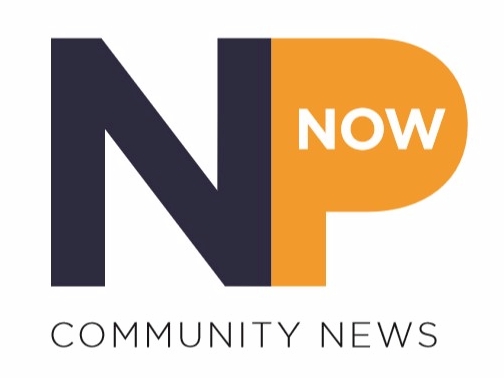
12 Tips for Answer Georgia College and State University Personal Essay Questions
Wednesday, August 28, 2024

Writing a strong personal essay is an essential component of the application process when you apply to Georgia College and State University (GCSU). In the personal essay questions , the themes of career goals, personal growth, and community service are often emphasised. The university asks the students to elaborate on why they are interested in a particular field of study or recount a challenging situation they went through and how they managed to resolve it.
Students can demonstrate their skills, achievements, and values by using real-life experiences as examples. In addition, the university’s personal essay questions require students to strike a balance between self-reflection and storytelling. Students must also present clear knowledge of how their experiences and prospective goals relate to the institution’s values.
However, some students do not have enough skills to effectively answer such questions while applying to university. So, this guide is for such students. Here, we will provide tips on writing a personal statement and answering such essay questions in your university application.
How to Answer Georgia College and State University Personal Essay Questions?
Georgia College aims to extend education outside of the classroom to support students' critical thinking abilities. Thus, they have incorporated such questions into the enrolment applications. Below are the 12 tips that will provide assistance with your essay questions and improve your chances of having your application accepted.
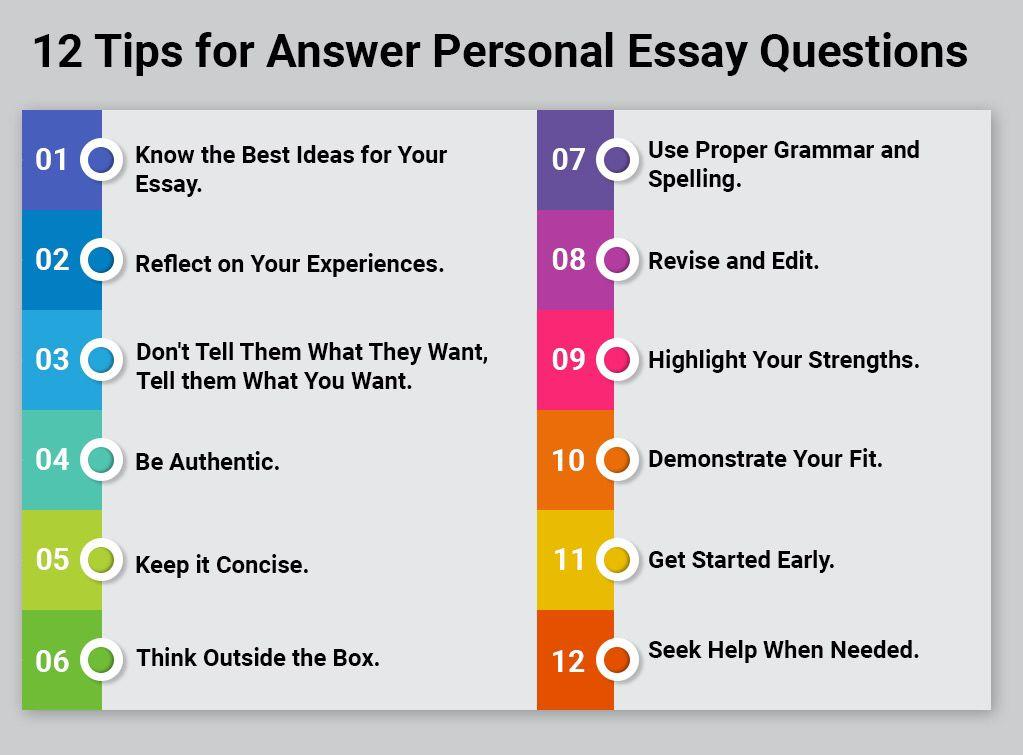
1. Know the Best Ideas for Your Essay
The personal essay questions Georgia College and State University are meant to add more insight into your application. In addition, the response to such personal essay topics helps the admission committee to know more about you. To write a strong essay, make sure that your thoughts are coherent and reflect your own experiences.
Here, we are providing you with some tricks to come up with amazing ideas:
- Understand the prompt.
- Read the question carefully.
- Get the core ideas.
Ideas Brainstorming
- Recall life events that have shaped who you are today.
- Think about how your social, academic or cultural backgrounds have influenced you.
- Remember times when you overcame challenges or achieved milestones in life.
- Focus on strengths or areas of passion for you.
Your ideas must:
- Be relevant to the prompt.
- Be realistic.
- In line with what the university stands for.
2. Reflect on Your Experiences
As you prepare to apply to university, remember the experiences that have contributed to shaping you the way you are now. Your essay should show how these developments, interests, and objectives align with the university's mission and values.
Think about the following points while you reflect on your experiences:
Obstacles and Challenges
What barriers or hurdles have hindered your progress in the past, and what methods did you capitalise on to go beyond them? Which abilities were sharpened from these experiences? How did these experiences affect your outlook towards life and your goals?
Positions and Duties in Leadership
Retrace your steps and recount what you acquired. Restate lessons you learned from playing a leading role.
Academic Accomplishments and Interests
Reverse the positions, think about yourself, and concentrate on your various achievements in class. How did you develop an interest in these areas, and what have they done to help you reach your goals?
Development of the Self and Self-Awareness
Apart from considering one’s personal developments, consider the times when challenges or disappointments were faced and dealt with. When and how did you confront these challenges? What did you learn about yourself while doing so?
As you think about these events, think about the following questions:
- What skills did this encounter assist me in developing or improving?
- What changes has this encounter brought to my ambitions and goals?
- In what way does this experience relate to my aspirations and objectives?
- What values or principles did this experience instil or reinforce in me?
- What precise moments or stories can I draw on?
3. Don't Tell them a Story They Want; Tell them What You Want
When crafting your essays for applications, it is easy to get into the comfort zone of writing in a way that seems pleasant to the members of the admissions committee. This approach, however, often fails to showcase your point. Instead, it is advisable to be unapologetically bold and tell the story you want to tell, regardless of who it will appeal to. Understand that it is very important to be real in your essay.
When writing your personal statement, consider these points:
- Focus on how the engagement aspects of your essay have been drawn from your unique experiences.
- Explain how being unique comes from expressing yourself on your own rather than what you believe the college would prefer to hear.
- Explain why authentic stories are more interesting as they are true and emotional.
- Argue that for your essay to capture attention, it is important to be free, vulnerable, and take risks in your narrative.
- Expressing your wishes reveals more about your true self, and that is what the college is looking for.
4. Be Authentic
Finding one’s values, beliefs, and passions is the heart of authenticity. This starts in the inner space where you try so hard to know yourself and decide which of your values are the most important. There is authenticity in overcoming the temptation to conform to other people’s expectations or remain true to one’s core beliefs. This offered a foundation of integrity and formed the basis of all other forms of honest living.
Here are some remarkable aspects of authenticity:
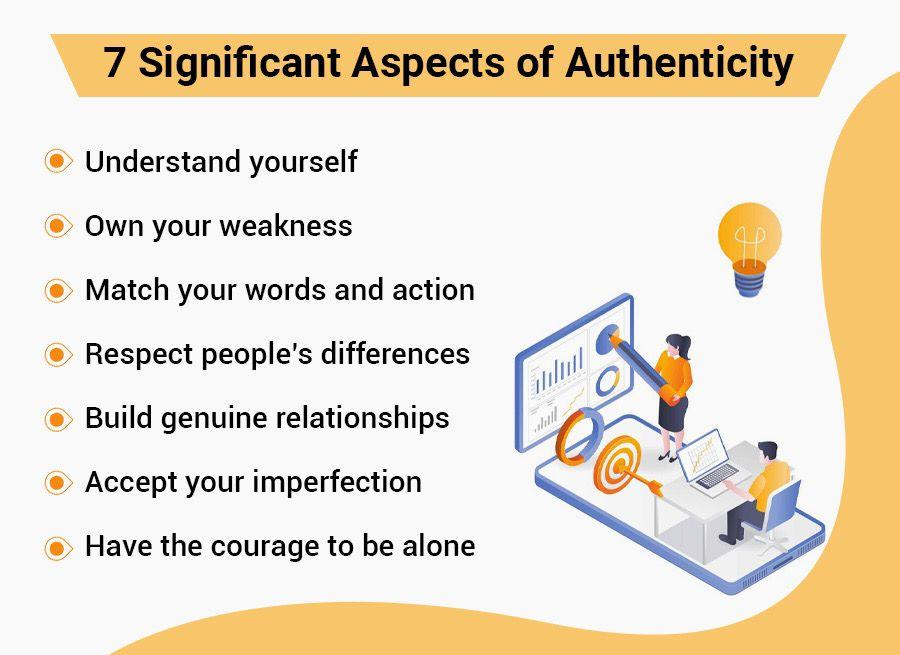
5. Keep it Concise
A well-developed statement is probably an important component of your university application. Therefore, this comprehensive guide is an opportunity to demonstrate your unique features, life history and aspirations to the admission committee.
Moreover, when it comes to providing an essay that stands out, there is a need to ensure that it is written interestingly and coherently and let it remain on topic. Here are some of the suggestions that can help you achieve this:
- Ensure that there is no room for ambiguity.
- Provide your readers with relevant examples.
- Avoid needless information.
- Choose simple and straight-to-the-point words.
6. Think Outside the Box!
Do not restrict yourself with commonly known details about yourself but be brave and include little more creativity in your paper.
Here are a few helpful hints that will assist you in doing so:
- Refusal may be miserable, but reluctantly tell the admissions committee your fabulous and unique achievements.
- In ways that are explosive to emotions or stretch one's imagination, draw a picture on the spare part of the essay and tell a story instead of better structuring it.
Most people approach the task of doing something different as a way of trying to succeed personally and professionally.
7. Use Proper Grammar and Spelling
In a personal statement, an applicant must pay attention to the structure of the essay, including spelling and grammatical conventions. To eliminate such mistakes, it is recommended to:
- Carry out a basic form to improve the writing of the essay.
- Utilise online resources for grammar and spell check.
- Seek feedback.
With these guidelines, students make sure that there will be no errors in answers to personal essay questions about grammar. It is also necessary to organise the document properly to be favourable to the admission board. In addition, you can also get samples from legit essay writing firms in the UK to understand the structure of personal essays for university applications.
8. Revise Often and Edit
Here, we are going to look into the need to edit and revise the answers we have written for the personal essay questions. By following these strategies, you can make your essay stand out.
- Remove unnecessary elements and improve the organisation of your work.
- Make your arguments and their supporting evidence stronger.
- Improve grammatical errors and sentence fluency.
- Express more of who you are through words and speech.
- Rectify gaps and inconsistencies in your narratives.
Editing your essay requires you to also look at the spelling, grammar or punctuation of the essay. When doing so, particularly pay attention to grammar, punctuation, length of sentences, word choice, and consistency.
How to start Editing your Essay?
Essay revision is checking the content, structure, and flow of the essay. While undertaking this process, take into consideration the following:
- Am I clear and focused in my thesis statement?
- Does the flow of my answers make sense?
- Do my anecdotes and examples of work support my points?
- Am I able to use the same voice/tone throughout the essay?
- Is there anything else that I could include to give more details?
9. Highlight Your Strengths
To stand out from other applicants, highlight your strengths in the essay. Before you put your pen on paper, spare a minute or two and try to recall particular events, achievements, and traits. To focus on your academic achievements, ask yourself:
- What are the specific achievements I have attained and the strong skills I possess in university?
- What are the objectives and aspirations I have about my career?
- What factors make me different from other people?
To highlight the strong points in your answer to personal essay questions, you can use examples and narratives. In addition, it is also advisable to highlight your soft skills and let your readers feel your passion and excitement.
10. Demonstrate Your Fit
A powerful piece detailing your personal experiences only works when you show how you fit into Georgia College and State University, its beliefs, and its aim. In addition, add the following salient features to your response to personal essay questions:
Background in Academia
Talk about your academic history first, highlighting any academic projects that show your readiness for the school you are applying to. Give details of any awards, competitions, or activities that underscore your achievements in your area of study.
Experience That Matters
Mention any planned internships or previous work experience which is relevant to the degree or course you are looking for. Explain how these experiences shaped your career goals.
Link to the University
Why do you want to study at Georgia College and State University? Justify why you believe this particular university is the most suitable for you. Explain how you will be useful to the school community considering the faculty members, research facilities and university culture.
Long-term Vision
Explain what the future is going to hold for you, particularly how you see the contribution you will make to the field of your choice after you finish the degree. Mention how your university education and experiences will create opportunities for you to achieve these goals and promote positive change as well. You may make arguments that positively reinforce yourself in terms of why you are a strong prospect for the program you are applying to.
11. Get Started Early
It is very important to start dealing with the Georgia College and State University personal essay questions as soon as possible. If you plan early, you will have sufficient time to arrange and write the essay content and predictably proofread it. This is why it is necessary to commence at the earliest point.
Why, then, should you get started early? Here are some of the reasons:
- Stress is decreased when you start early!
- You'll generate more ideas if you give yourself more time to brainstorm!
- You may demonstrate to the admissions committee that you are serious about attending the university.
- You are prepared to put in the time and effort to learn more about it by researching it and its core values.
- You'll have more time to proofread, edit, and refine your responses.
12. Seek Help When Needed
Assistance seeking is very important, particularly when responding to a personal essay question. One can feel immense pressure to perform well, and this is understandable. Furthermore, it’s important to recognise when you are stuck and need help.
A teacher, mentor, or guidance counsellor offers support to craft a good paper. You can also purchase your essay from online resources that will lead to successful admission to your desired university.
How to answer Georgia College and State University Personal Essay Questions?
Here are the tips for answering these question types;
- Do not be afraid of making your voice heard.
- Structure a clear and interesting essay.
- Make use of the words and writing skills that you already have.
- Write about yourself. But don't try to encapsulate your whole life!
- Answer the question that has been asked.
- Read it over again!
- Write on the internet in a networked word processor.
What should be included in College and State University Personal Essay Questions?
It is best to talk about both positive and negative matters, a humiliating experience, or a quality or interest that exemplifies your values. If you are honest about the issue, character flaws, or sad childhood events, the reader will find it far more credible.
In addition, it will exhibit your personal life experiences that the admission panel wants to know. So, by including all the information, you can fulfil the true objective of such essay types in application forms.
The importance of the personal essay questions in the Georgia College and State University application process enables candidates to make the best impression and talk more about themselves. An effective essay can provide a student’s perspective to the admission committees, which are usually standardised, and help to distinguish them from everyone else.
Moreover, students can show in their essays how well they will integrate themselves into the programs by spinning a good and well-organised narrative. Finally, submitting an excellent personal essay shows that the candidate is open and honest. In addition, the applicant understands what the university is all about and its values.
Students who follow such practice can write a good manuscript, which allows them to develop their competencies and increase their chances of being accepted into university. Thus, they can begin their developmental, educational, and achievement-oriented journey and fulfil all their academic and career ambitions.

Chris Bates
More like this story:.
- Rediscovering Timeless Style: My Journey with Bronson Mfg
- Electric Fat Tire Bike Battery Guide: Understanding Voltage, Amp Hours, and Watt Hours
- If you’re going to Playa del Carmen, head to Fifth Avenue
Friday, August 30, 2024
Most popular.
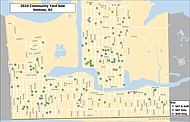
Ventnor City Yardsale Map and List
| S | M | T | W | T | F | S |
|---|---|---|---|---|---|---|
To Submit an Event Sign in first
Today's events.
No calendar events have been scheduled for today.

APA Style for beginners
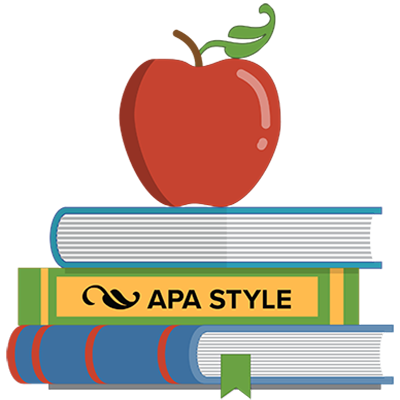
Then check out some frequently asked questions:
What is APA Style?
Why use apa style in high school, how do i get started with apa style, what apa style products are available, your help wanted.
APA Style is the most common writing style used in college and career. Its purpose is to promote excellence in communication by helping writers create clear, precise, and inclusive sentences with a straightforward scholarly tone. It addresses areas of writing such as how to
- format a paper so it looks professional;
- credit other people’s words and ideas via citations and references to avoid plagiarism; and
- describe other people with dignity and respect using inclusive, bias-free language.
APA Style is primarily used in the behavioral sciences, which are subjects related to people, such as psychology, education, and nursing. It is also used by students in business, engineering, communications, and other classes. Students use it to write academic essays and research papers in high school and college, and professionals use it to conduct, report, and publish scientific research .
High school students need to learn how to write concisely, precisely, and inclusively so that they are best prepared for college and career. Here are some of the reasons educators have chosen APA Style:
- APA Style is the style of choice for the AP Capstone program, the fastest growing AP course, which requires students to conduct and report independent research.
- APA Style helps students craft written responses on standardized tests such as the SAT and ACT because it teaches students to use a direct and professional tone while avoiding redundancy and flowery language.
- Most college students choose majors that require APA Style or allow APA Style as an option. It can be overwhelming to learn APA Style all at once during the first years of college; starting APA Style instruction in high school sets students up for success.
High school students may also be interested in the TOPSS Competition for High School Psychology Students , an annual competition from the APA Teachers of Psychology in Secondary Schools for high school students to create a short video demonstrating how a psychological topic has the potential to benefit their school and/or local community and improve people’s lives.
Most people are first introduced to APA Style by reading works written in APA Style. The following guides will help with that:
|
|
|
|
| Handout explaining how journal articles are structured and how to become more efficient at reading and understanding them |
|
| Handout exploring the definition and purpose of abstracts and the benefits of reading them, including analysis of a sample abstract |
Many people also write research papers or academic essays in APA Style. The following resources will help with that:
|
|
|
|
| Guidelines for setting up your paper, including the title page, font, and sample papers |
|
| More than 100 reference examples of various types, including articles, books, reports, films, social media, and webpages |
|
| Handout comparing example APA Style and MLA style citations and references for four common reference types (journal articles, books, edited book chapters, and webpages and websites) |
|
| Handout explaining how to understand and avoid plagiarism |
|
| Checklist to help students write simple student papers (typically containing a title page, text, and references) in APA Style |
|
| Handout summarizing APA’s guidance on using inclusive language to describe people with dignity and respect, with resources for further study |
|
| Free tutorial providing an overview of all areas of APA Style, including paper format, grammar and usage, bias-free language, punctuation, lists, italics, capitalization, spelling, abbreviations, number use, tables and figures, and references |
|
| Handout covering three starter areas of APA Style: paper format, references and citations, and inclusive language |
Instructors will also benefit from using the following APA Style resources:
|
|
|
|
| Recording of a webinar conducted in October 2023 to refresh educators’ understanding of the basics of APA Style, help them avoid outdated APA Style guidelines (“zombie guidelines”), debunk APA Style myths (“ghost guidelines”), and help students learn APA Style with authoritative resources |
|
| Recording of a webinar conducted in May 2023 to help educators understand how to prepare high school students to use APA Style, including the relevance of APA Style to high school and how students’ existing knowledge MLA style can help ease the transition to APA Style (register for the webinar to receive a link to the recording) |
|
| Recording of a webinar conducted in September 2023 to help English teachers supplement their own APA Style knowledge, including practical getting-started tips to increase instructor confidence, the benefits of introducing APA Style in high school and college composition classes, some differences between MLA and APA Style, and resources to prepare students for their future in academic writing |
|
| Poster showing the three main principles of APA Style: clarity, precision, and inclusion |
|
| A 30-question activity to help students practice using the APA Style manual and/or APA Style website to look up answers to common questions |
In addition to all the free resources on this website, APA publishes several products that provide comprehensive information about APA Style:
|
|
|
|
| The official APA Style resource for students, covering everything students need to know to write in APA Style |
|
| The official source for APA Style, containing everything in the plus information relevant to conducting, reporting, and publishing psychological research |
|
| APA Style’s all-digital workbook with interactive questions and graded quizzes to help you learn and apply the basic principles of APA Style and scholarly writing; integrates with popular learning management systems, allowing educators to track and understand student progress |
|
| APA’s online learning platform with interactive lessons about APA Style and academic writing, reference management, and tools to create and format APA Style papers |
The APA Style team is interested in developing additional resources appropriate for a beginner audience. If you have resources you would like to share, or feedback on this topic, please contact the APA Style team .
Free newsletter
Apa style monthly.
Subscribe to the APA Style Monthly newsletter to get tips, updates, and resources delivered directly to your inbox.
Welcome! Thank you for subscribing.

Online Students
For All Online Programs
International Students
On Campus, need or have Visa
Campus Students
For All Campus Programs
Academic Referencing: How to Cite a Research Paper

Learning how to conduct accurate, discipline-specific academic research can feel daunting at first. But, with a solid understanding of the reasoning behind why we use academic citations coupled with knowledge of the basics, you’ll learn how to cite sources with accuracy and confidence.

When it comes to academic research, citing sources correctly is arguably as important as the research itself. "Your instructors are expecting your work to adhere to these professional standards," said Amanda Girard , research support manager of Shapiro Library at Southern New Hampshire University (SNHU).
With Shapiro Library for the past three years, Girard manages the library’s research support services, which includes SNHU’s 24/7 library chat and email support. She holds an undergraduate degree in professional writing and a graduate degree in library and information science. She said that accurate citations show that you have done your research on a topic and are knowledgeable about current ideas from those actively working in the field.
In other words, when you cite sources according to the academic style of your discipline, you’re giving credit where credit is due.
Why Cite Sources?
Citing sources properly ensures you’re following high academic and professional standards for integrity and ethics.

“When you cite a source, you can ethically use others’ research. If you are not adequately citing the information you claim in your work, it would be considered plagiarism ,” said Shannon Geary '16 , peer tutor at SNHU.
Geary has an undergraduate degree in communication from SNHU and has served on the academic support team for close to 2 years. Her job includes helping students learn how to conduct research and write academically.
“In academic writing, it is crucial to state where you are receiving your information from,” she said. “Citing your sources ensures that you are following academic integrity standards.”
According to Geary and Girard, several key reasons for citing sources are:
- Access. Citing sources points readers to original sources. If anyone wants to read more on your topic, they can use your citations as a roadmap to access the original sources.
- Attribution. Crediting the original authors, researchers and experts shows that you’re knowledgeable about current ideas from those actively working in the field and adhering to high ethical standards, said Girard.
- Clarity. “By citing your sources correctly, your reader can follow along with your research,” Girard said.
- Consistency. Adhering to a citation style provides a framework for presenting ideas within similar academic fields. “Consistent formatting makes accessing, understanding and evaluating an author's findings easier for others in related fields of study,” Geary said.
- Credibility. Proper citation not only builds a writer's authority but also ensures the reliability of the work, according to Geary.
Ultimately, citing sources is a formalized way for you to share ideas as part of a bigger conversation among others in your field. It’s a way to build off of and reference one another’s ideas, Girard said.
How Do You Cite an Academic Research Paper?
Any time you use an original quote or paraphrase someone else’s ideas, you need to cite that material, according to Geary.
“The only time we do not need to cite is when presenting an original thought or general knowledge,” she said.
While the specific format for citing sources can vary based on the style used, several key elements are always included, according to Girard. Those are:
- Title of source
- Type of source, such as a journal, book, website or periodical
By giving credit to the authors, researchers and experts you cite, you’re building credibility. You’re showing that your argument is built on solid research.
“Proper citation not only builds a writer's authority but also ensures the reliability of the work,” Geary said. “Properly formatted citations are a roadmap for instructors and other readers to verify the information we present in our work.”
Common Citation Styles in Academic Research
Certain disciplines adhere to specific citation standards because different disciplines prioritize certain information and research styles . The most common citation styles used in academic research, according to Geary, are:
- American Psychological Association, known as APA . This style is standard in the social sciences such as psychology, education and communication. “In these fields, research happens rapidly, which makes it exceptionally important to use current research,” Geary said.
- Modern Language Association, known as MLA . This style is typically used in literature and humanities because of the emphasis on literature analysis. “When citing in MLA, there is an emphasis on the author and page number, allowing the audience to locate the original text that is being analyzed easily,” Geary said.
- Chicago Manual of Style, known as Chicago . This style is typically used in history, business and sometimes humanities. “(Chicago) offers flexibility because of the use of footnotes, which can be seen as less distracting than an in-text citation,” Geary said.
The benefit of using the same format as other researchers within a discipline is that the framework of presenting ideas allows you to “speak the same language,” according to Girard.

APA Citation for College: A Brief Overview
Are you writing a paper that needs to use APA citation, but don’t know what that means? No worries. You’ve come to the right place.

How to Use MLA Formatting: A Brief Overview
Are you writing a paper for which you need to know how to use MLA formatting, but don’t know what that means? No worries. You’ve come to the right place.
How to Ensure Proper Citations
Keeping track of your research as you go is one of the best ways to ensure you’re citing appropriately and correctly based on the style that your academic discipline uses.
“Through careful citation, authors ensure their audience can distinguish between borrowed material and original thoughts, safeguarding their academic reputation and following academic honesty policies,” Geary said.
Some tips that she and Girard shared to ensure you’re citing sources correctly include:
- Keep track of sources as you work. Writers should keep track of their sources every time an idea is not theirs, according to Geary. “You don’t want to find the perfect research study and misplace its source information, meaning you’d have to omit it from your paper,” she said.
- Practice. Even experienced writers need to check their citations before submitting their work. “Citing requires us to pay close attention to detail, so always start your citation process early and go slow to ensure you don’t make mistakes,” said Geary. In time, citing sources properly becomes faster and easier.
- Use an Online Tool . Geary recommends the Shapiro Library citation guide . You can find sample papers, examples of how to cite in the different academic styles and up-to-date citation requirements, along with information and examples for APA, MLA and Chicago style citations.
- Work with a Tutor. A tutor can offer support along with tips to help you learn the process of academic research. Students at SNHU can connect with free peer tutoring through the Academic Support tab in their online courses, though many colleges and universities offer peer tutoring.
Find Your Program
How to cite a reference in academic writing.
A citation consists of two pieces: an in-text citation that is typically short and a longer list of references or works cited (depending on the style used) at the end of the paper.
“In-text citations immediately acknowledge the use of external source information and its exact location,” Geary said. While each style uses a slightly different format for in-text citations that reference the research, you may expect to need the page number, author’s name and possibly date of publication in parentheses at the end of a sentence or passage, according to Geary.
A longer entry listing the complete details of the resource you referenced should also be included on the references or works cited page at the end of the paper. The full citation is provided with complete details of the source, such as author, title, publication date and more, Geary said.
The two-part aspect of citations is because of readability. “You can imagine how putting the full citation would break up the flow of a paper,” Girard said. “So, a shortened version is used (in the text).”
“For example, if an in-text citation reads (Jones, 2024), the reader immediately knows that the ideas presented are coming from Jones’s work, and they can explore the comprehensive citation on the final page,” she said.
The in-text citation and full citation together provide a transparent trail of the author's process of engaging with research.
“Their combined use also facilitates further research by following a standardized style (APA, MLA, Chicago), guaranteeing that other scholars can easily connect and build upon their work in the future,” Geary said.
Developing and demonstrating your research skills, enhancing your work’s credibility and engaging ethically with the intellectual contributions of others are at the core of the citation process no matter which style you use.
A degree can change your life. Choose your program from 200+ SNHU degrees that can take you where you want to go.
A former higher education administrator, Dr. Marie Morganelli is a career educator and writer. She has taught and tutored composition, literature, and writing at all levels from middle school through graduate school. With two graduate degrees in English language and literature, her focus — whether teaching or writing — is in helping to raise the voices of others through the power of storytelling. Connect with her on LinkedIn .
Explore more content like this article

What is the Difference Between Bachelor’s and Master’s Degrees?

What is Considered Plagiarism And How to Avoid It

Degrees vs. Certificate Programs: What's the Difference?
About southern new hampshire university.

SNHU is a nonprofit, accredited university with a mission to make high-quality education more accessible and affordable for everyone.
Founded in 1932, and online since 1995, we’ve helped countless students reach their goals with flexible, career-focused programs . Our 300-acre campus in Manchester, NH is home to over 3,000 students, and we serve over 135,000 students online. Visit our about SNHU page to learn more about our mission, accreditations, leadership team, national recognitions and awards.

IMAGES
VIDEO
COMMENTS
Since one of the main goals of the essay is to help you stand out, it doesn't really help to do the same thing that countless other people are doing. For example, almost everyone writing about losing the big game ends up writing the same "lessons learned" about humility, teamwork, overcoming disappointment, etc.
Follow this advice to know what not to write about in your college essay! 1. Don't restate the Essay prompt. Start your essay with a hook. Start with dialogue. Start by setting the scene. Don't start by restating the essay topic! The reader knows the essay prompts, so just start telling your story.
Learn what not to write in college essays if you want to make a great impression on the schools you apply to. Find out 11 topics to steer clear of, such as controversial, personal, or humorous topics, and why they might hurt your chances of being accepted.
Learn how to write an honest, personal, and unique college essay that showcases your personality and fit for a specific campus. Avoid common pitfalls such as clichés, impressions, and cover letters in your essay.
Tragedies. In and of themselves, tragedies are not necessarily a bad topic for college essays. However, it can be easy to fall into cliched writing as you tell these stories. Hackneyed themes and phrases include "life is short," "time heals all wounds," and "seize the day.". If you write about a tragedy you have known or experienced ...
Avoid sensationalizing or dwelling excessively on the tragedy itself.Personal accidents or injuries: If you've experienced a serious accident or injury, be cautious when writing about it. Instead of focusing solely on the negative aspects, highlight your determination, perseverance, or the lessons learned during the recovery process.
DO write an ending, not a conclusion. Building on the idea of not writing a school essay, having a story arc, and breaking away from form, your essay still does need to have an ending. What it doesn't need is a conclusion. Conclusions wrap things up with a bow. You are a human, not a present.
Use your essays to empower your chances of acceptance, merit money, and scholarships.". This college essay tip is by Dr. Rebecca Joseph, professor at California State University and founder of All College Application Essays, develops tools for making the college essay process faster and easier. 15. Get personal.
Identifying an experience that exemplifies that value or fundamental truth. Writing a thoughtful essay that uses your "uninteresting" experience to say something interesting about yourself. 1. Get the Ball Rolling. There are many different practices you might find useful as you start brainstorming your college essay.
Essay 1: Sharing an identity or background through a montage. Essay 2: Overcoming a challenge, a sports injury narrative. Essay 3: Showing the influence of an important person or thing. Other interesting articles. Frequently asked questions about college application essays.
It's better to avoid upsetting or angering that person. Writing a one-sided diatribe about guns, abortion, the death penalty, immigration, or anything else in the news. Even if you can marshal facts in your argument, this essay is simply the wrong place to take a narrow, unempathetic side in an ongoing debate.
Sample College Essay 2 with Feedback. This content is licensed by Khan Academy and is available for free at www.khanacademy.org. College essays are an important part of your college application and give you the chance to show colleges and universities your personality. This guide will give you tips on how to write an effective college essay.
Again, we'd recommend sticking with standard fonts and sizes—Times New Roman, 12-point is a standard workhorse. You can probably go with 1.5 or double spacing. Standard margins. Basically, show them you're ready to write in college by using the formatting you'll normally use in college.
Tips for a Stellar College Application Essay. 1. Write about something that's important to you. It could be an experience, a person, a book—anything that has had an impact on your life. 2. Don't just recount—reflect! Anyone can write about how they won the big game or the summer they spent in Rome.
Making an all-state team → outstanding achievement. Making an all-state team → counting the cost of saying "no" to other interests. Making a friend out of an enemy → finding common ground, forgiveness. Making a friend out of an enemy → confront toxic thinking and behavior in yourself.
Avoid passing your paper along to too many people, though, so you don't lose your own voice amid all of the edits and suggestions. The admissions team wants to get to know you through your writing and not your sister or best friend who edited your paper. 5. Revise your essay. Your first draft is just that: a draft.
Don't Repeat. If you've mentioned an activity, story, or anecdote in some other part of your application, don't repeat it again in your essay. Your essay should tell college admissions officers something new. Whatever you write in your essay should be in philosophical alignment with the rest of your application.
Academic works suppose using full words, so write them rather than contractions. 2) Idioms. Set phrases enrich a language, but leave them for personal stories, blog posts, or fiction books. An admission essay is a task to check your skills of formal writing, not your ability to entertain or wow professors with flourished vocabulary.
Don't waste time telling me things I can read elsewhere in your application. Use your essay to give the admissions officer insights into your motivations, interests, and thinking. Don't make your ...
Essays are where we get to engage with students' hopes, fears, dreams, life experiences (and more) in their authentic voice. We are humbled every year getting to "meet" all the incredible young people who are applying to Notre Dame through their essays! Yet, writing an essay introducing yourself can be really hard.
Your essay should have one central theme or focus. You should provide examples and anecdotes that link to the central theme. Structuring the Essay . You should create an essay outline consisting of an introduction, body paragraphs, and a conclusion. Set more free-writing timers to write the body and conclusion.
Writing the best college essays is an important part of the application process. It gives the admission committee more information about the applicant besides the academic achievements. Thus, using famous college essay examples, you can understand how to explain your experiences, viewpoints, and goals in a manner that will be interesting to ...
Part of the study included an experiment where people read the same paragraph from a college essay. While the paragraphs stayed the same, the information about how the student wrote the essay changed.
Your college essay may not even have a clear thesis statement, and that's okay. You should not summarize your essay in your conclusion either. A pointed summary of all the main points of your college essay may seem memorable, but it lacks creativity and can seem as though you're talking down to the reader. ... When writing the perfect ...
This college essay tip is by Abigail McFee, Admissions Counselor for Tufts University and Tufts '17 graduate. 2. Write like a journalist. "Don't bury the lede!" The first few sentences must capture the reader's attention, provide a gist of the story, and give a sense of where the essay is heading.
Writing a strong personal essay is an essential component of the application process when you apply to Georgia College and State University (GCSU). In the personal essay questions, the themes of career goals, personal growth, and community service are often emphasised. The university asks the students to elaborate on why they are interested in a particular field of study or recount a ...
APA Style is the most common writing style used in college and career. Its purpose is to promote excellence in communication by helping writers create clear, precise, and inclusive sentences with a straightforward scholarly tone. It addresses areas of writing such as how to. format a paper so it looks professional;
She has taught and tutored composition, literature, and writing at all levels from middle school through graduate school. With two graduate degrees in English language and literature, her focus — whether teaching or writing — is in helping to raise the voices of others through the power of storytelling. Connect with her on LinkedIn.
That's where Decision Points comes in. I'm not a certified college adviser. This is obviously not bespoke advice. You can find all of that here.But I grew up in a higher-education family and ...
Not only does Trump own a majority of the shares, he is the most popular user on the company's central product, Truth Social. The company's ticker symbol is even "DJT."